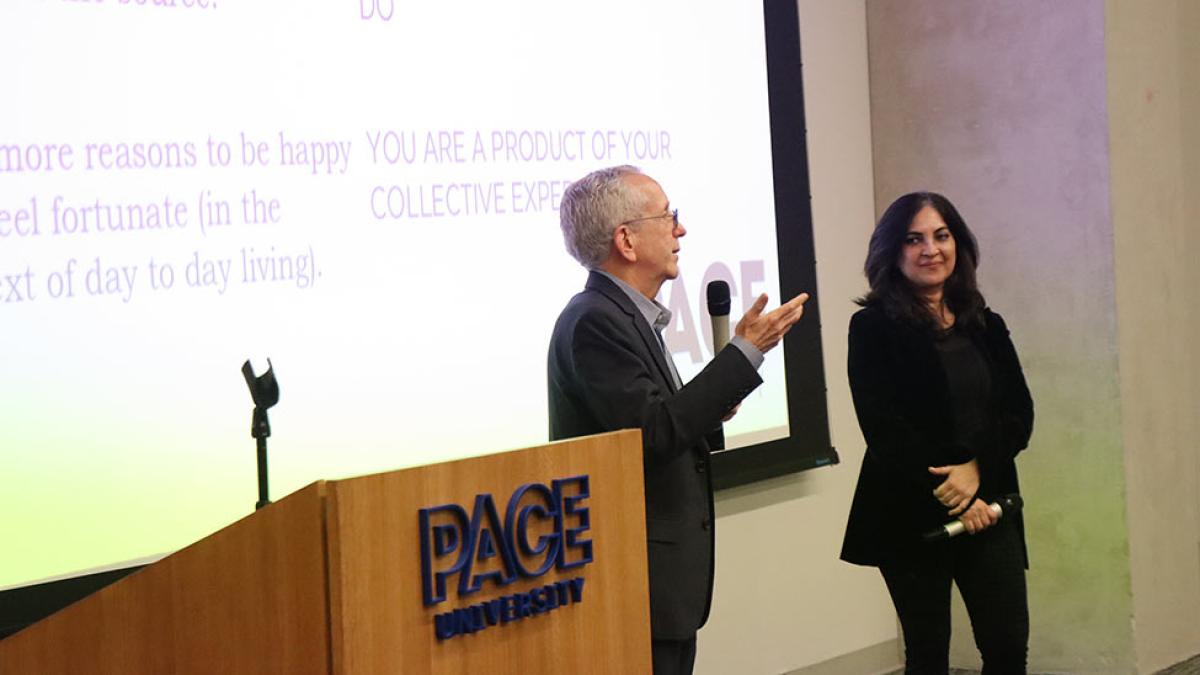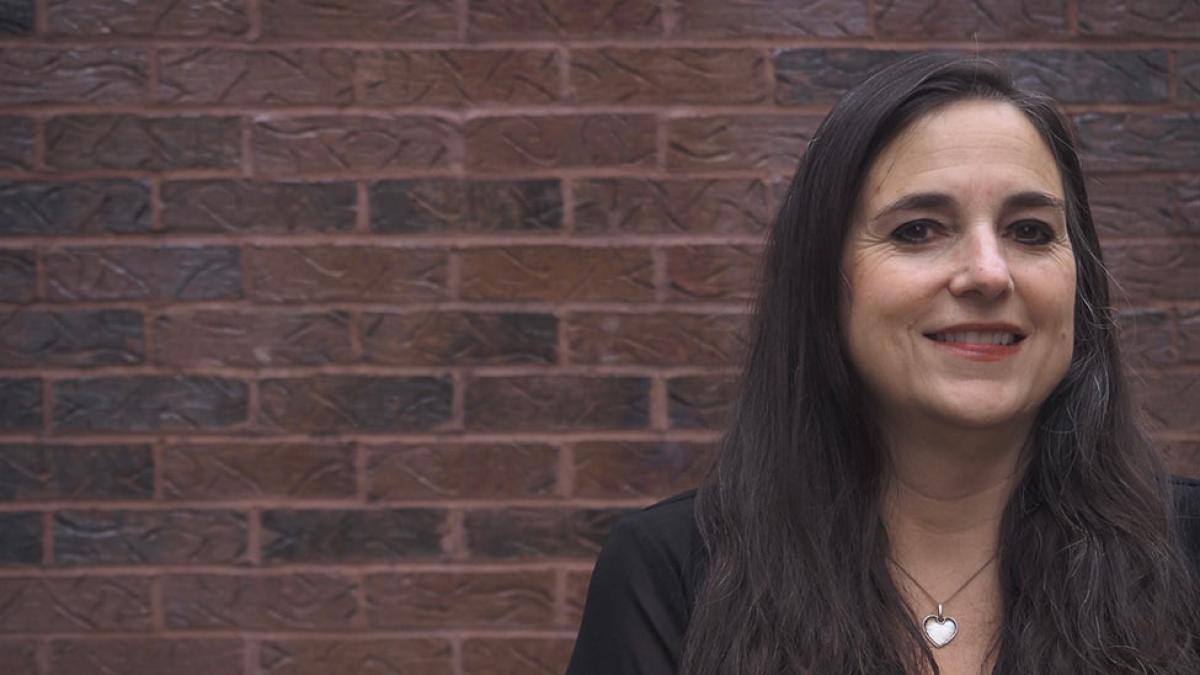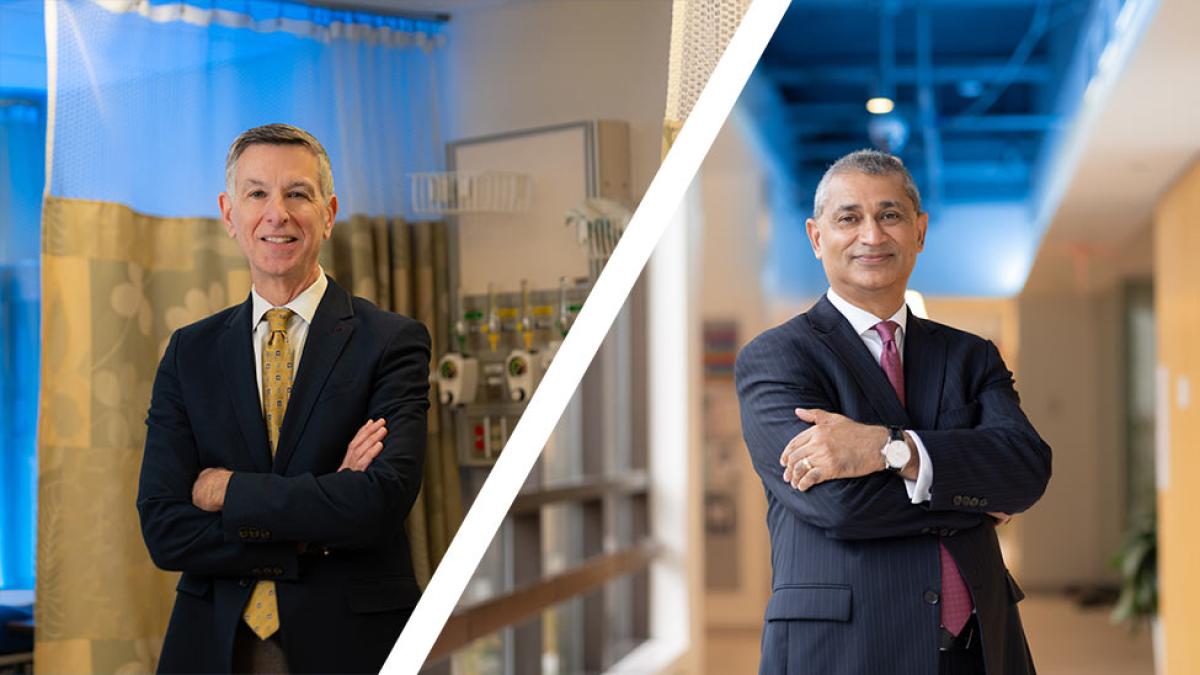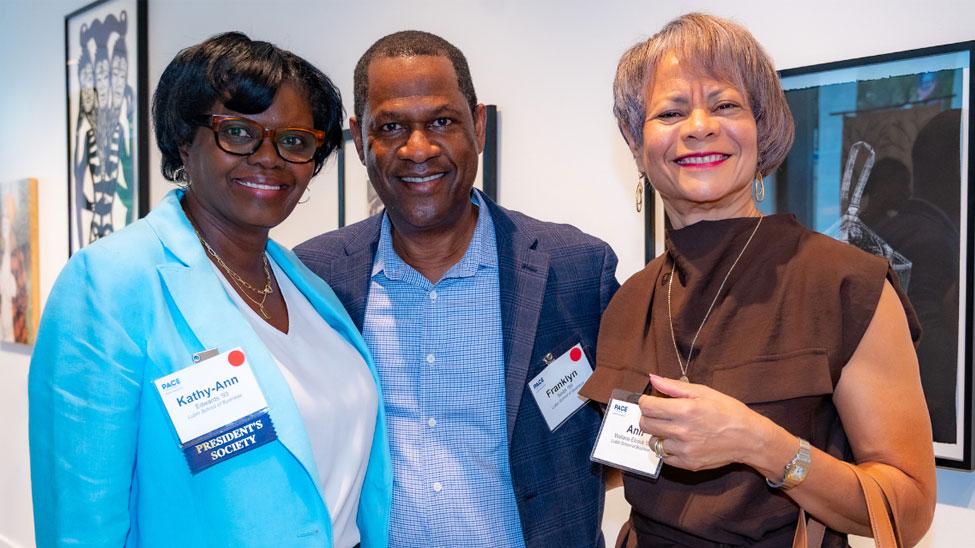
From the Caribbean to Campus
When Joseph Benfield ’91, Kathy-Ann Edwards ’93, and Franklyn Smith ’89 arrived at Pace from across the Caribbean, they found more than an education—they found a community that believed in them. Today, they are channeling that shared experience into meaningful impact, establishing a scholarship that honors their journey and invests in the future of Caribbean and Black business students at Pace.
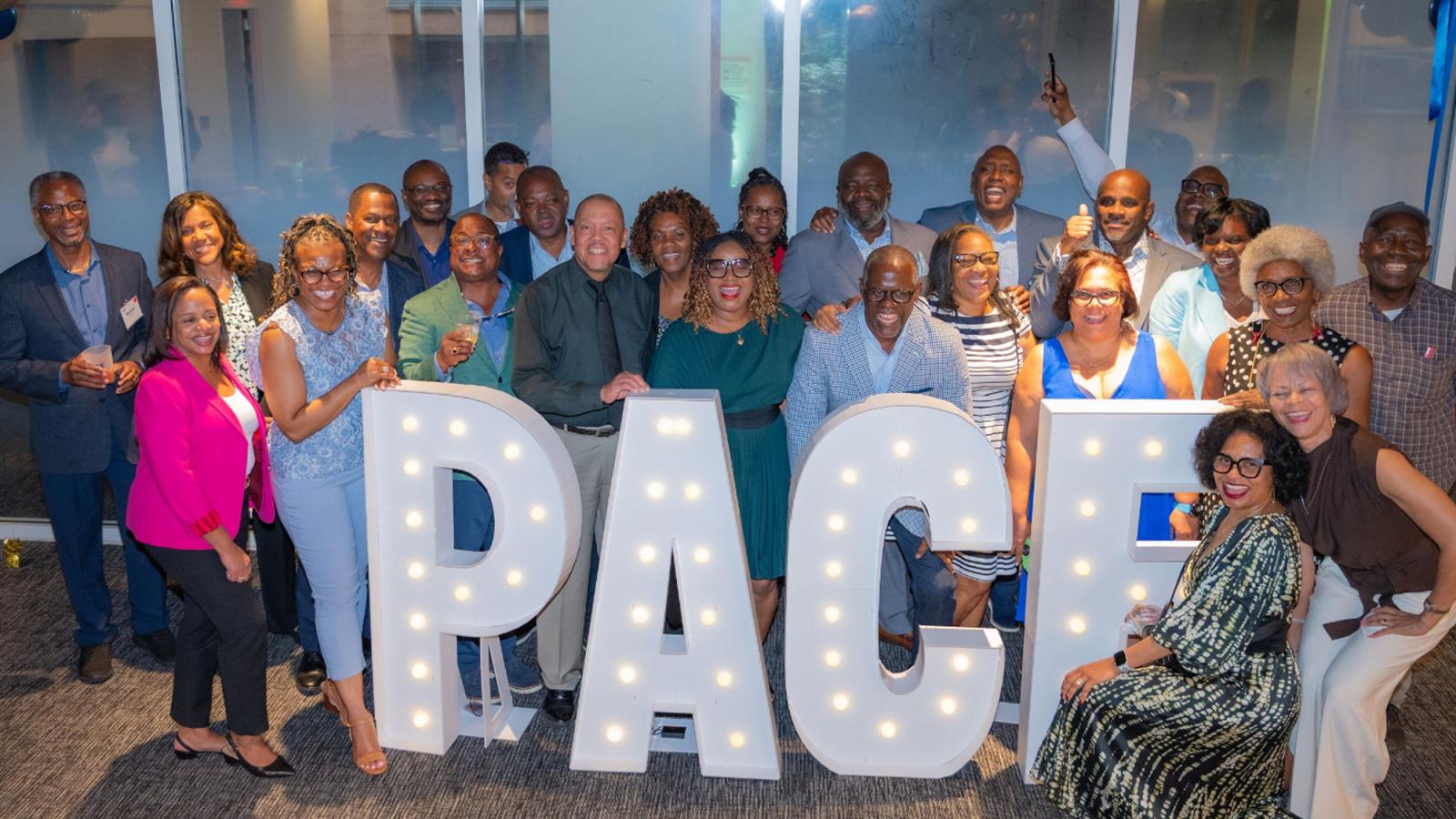
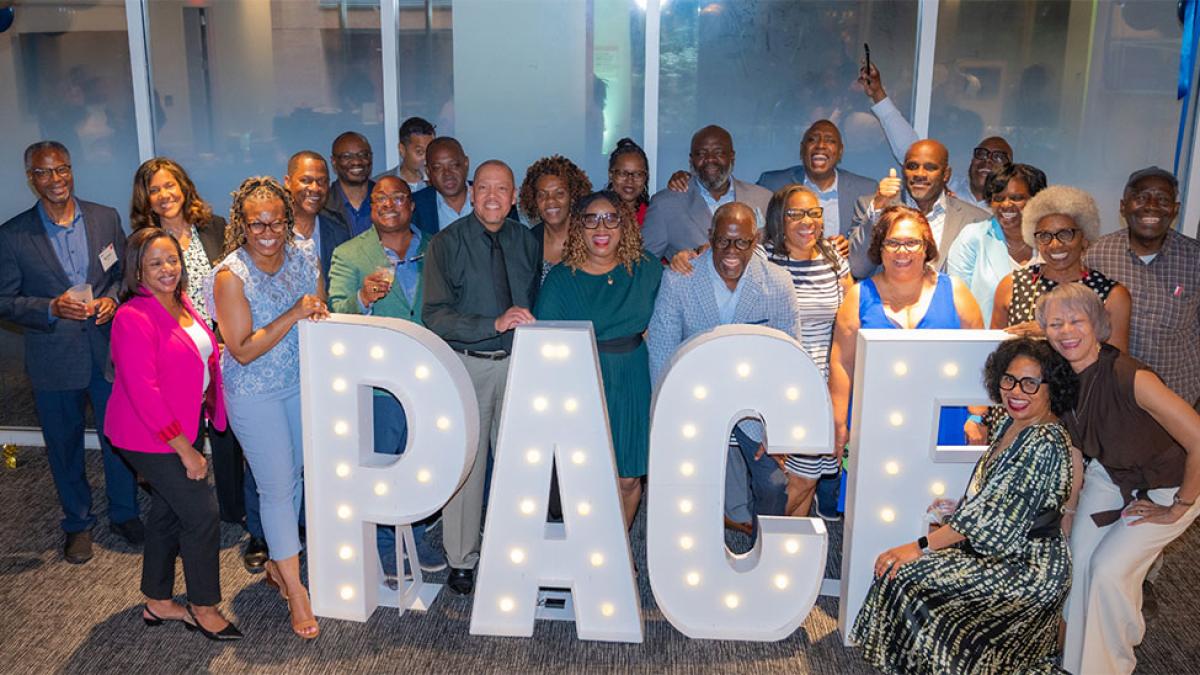
Pace has long been a hub for Caribbean students pursuing their academic and professional goals. Now, three successful alumni are using their stories to inspire a new chapter in Pace’s proud history of Caribbean student success.
Decades after first crossing paths as Pace University students, Joseph Benfield ’91, Kathy-Ann Edwards ’93, and Franklyn Smith ’89 are still among one another’s closest friends. In fact, they count themselves as part of a broad and close-knit community of Caribbean Pace alumni whose bonds of friendship have endured long past their final walks across the Pace commencement stage.
From the tropics to the towering skyscrapers of Lower Manhattan and beyond, Joseph, Kathy-Ann, Franklyn, and their network of kindred Caribbean Pace alumni have been there for one another through it all: new cultural acclimations, the rigors of university life, challenging CPA exams, first jobs, and the many professional triumphs that have defined their respective careers.
The root of their success? They say it all goes back to the community of like-minded, big-dreaming Caribbean students they found when they first arrived at Pace.
“The Caribbean Pace Community has been absolutely instrumental,” Kathy-Ann said. “We’ve made each other the people we are today. If I had to rewrite our story, I wouldn’t write it any other way.”
A Seismic Transition
While the trio share a cherished Caribbean heritage, their distinct journeys to Pace NYC speak to the vibrant diversity of experiences in their home region, the varying paths to university achievement, and the global connections that bring students from around the world to Pace’s New York City Campus.

Kathy-Ann, born and raised in Trinidad, was encouraged to attend Pace by her high school guidance counselor, who was a Pace alumna herself. Joseph, who arrived in the United States from Guyana with just $200 in his pocket, was referred to Pace by a cousin, also a Pace alumnus, who had ascended the ranks at CBS as a company controller. And Franklyn, the fourth youngest of twelve children from a small village in Antigua, worked for three years after high school to save money for college. He enrolled at Pace because that’s where he felt he could get the most bang for his hard-earned buck.
For all three, the transition was seismic: a new country, a new culture, and the new pressures that come with pursuing—and paying for—a college education. But at Pace, they found a vital support system ready to inspire and uplift them as they worked toward fulfilling their dreams.
“We all basically started from nothing,” Franklyn said. “But there were so many Caribbean students at Pace who were behind us. With our Caribbean classmates, regardless of what island we were from, we all had similar backgrounds, so it was easy to get connected. Once I got to Pace, with our Caribbean folks, I was comfortable.”
“That was our family in the United States,” Joseph added. “I worked full-time and went to school full-time, but meeting these people at Pace, getting involved with organizations like the Caribbean Student Association, that was hugely important. Whether we were from Trinidad or Antigua or Guyana, we were all from the Caribbean. It felt like home.”
Finding a Path at Pace
Energized by their community of Caribbean classmates and buoyed by support from organizations like the Caribbean Student Association and the National Association of Black Accountants (NABA), Joseph, Kathy-Ann, and Franklyn all excelled as accounting students in Pace’s Lubin School of Business. They credit instructors like Emeritus Professor of Accounting Rudy Jacob (a fellow Guyanese, Joseph was quick to note) and advisors like Professor John Aheto with identifying their innate potential and challenging them to reach beyond the limits of what they believed they could accomplish.
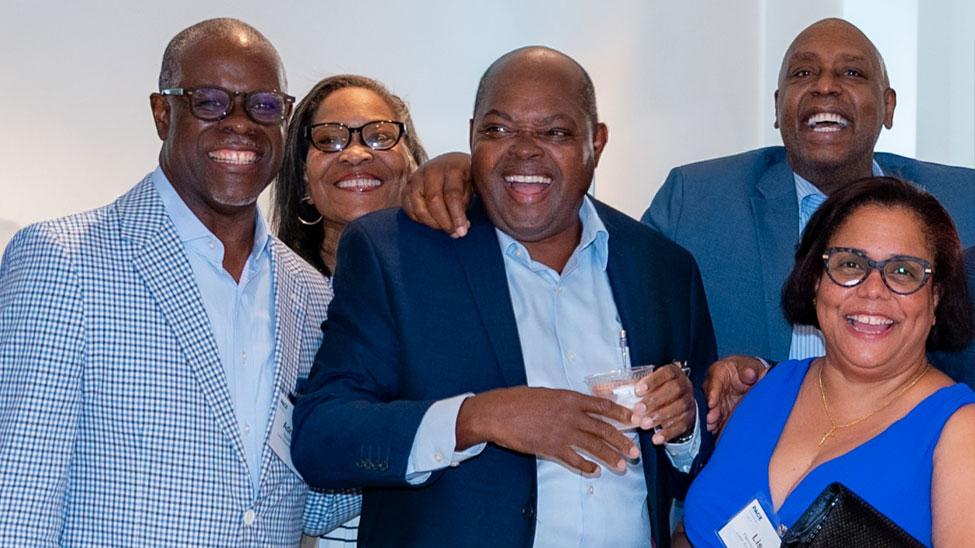
The Pace administration, too, played an essential role in their success, the trio added, especially through efforts to connect them with the resources and financial aid they needed to complete their programs.
In the end, that support and special attention from Pace mentors paid off. Each member of the trio passed their CPA exams on the first attempt, and they weren’t the only ones.
“There were probably 25 people who all passed the exam on the first try in my class,” Franklyn said. “We were well, well prepared by Pace.”
Industry Excellence
Franklyn, the first member of the trio to graduate from Pace, quickly secured a position at PwC, one of the Big Four accounting firms and among the most prestigious firms in the world. Kathy-Ann and Joseph soon followed in Franklyn’s footsteps, landing their own positions at the firm after receiving their Pace degrees.
PwC was a competitive and intense environment, the trio said, but they felt positioned by their Pace education to tackle its challenges and distinguish themselves as leaders among their peers. Franklyn recently retired as a partner at the firm after 32 years and now sits on the boards of several significant companies. Kathy-Ann just passed her 32-year mark at PwC, where she serves as a trust solutions partner and mentor to countless colleagues. And Joseph departed PwC’s New York office in 1997 after a successful six-year tenure—“I could no longer handle the cold,” he quipped—to continue his career back in the Caribbean, where he has served as a banking services CFO, the CEO of Josa Investments, and, by special request of the prime minister of Barbados, the CFO of the Cricket World Cup, the third-largest sporting event in the world.
According to each of them, their decades of professional success can be traced back in large part to the career preparation Pace provided.
“The opportunities we had at Pace put a lot of tools in our toolkit,” Kathy-Ann said. “It taught us how to survive and thrive in corporate America. Organizations on campus like NABA and the Accounting, Finance, and Management Association put us in situations where we had to build professional skill sets before we even graduated. Those experiences prepared us well for where we landed.”
Paying It Forward
Today, Joseph, Kathy-Ann, Franklyn, and their Rolodex of Caribbean Pace alumni are working hard to ensure future students receive the same career-centered opportunities that were so foundational to their own success.
In 2024, the group came together to establish the Legacy of the Island Scholarship Sponsored by Pace Caribbean Alumni, a fund designed to support Pace business students with financial need who have a demonstrated interest in Black or Caribbean culture. Establishing a scholarship was the natural culmination of their journey, from Pace students to alumni to industry leaders, they said. Added to their extensive service to Pace as volunteers and alumni advocates, the scholarship further affirms their dedication to giving back to the University that meant so much to them.
What better way to show students, particularly students from the Caribbean, like them, the extraordinary things that can be achieved when a community unites to lift one another up?
“This University did everything for me,” Franklyn said. “It’s done so much for all of us. I’m very proud of Pace, and I always want to help make someone else’s life just a little easier while supporting the University as well.”
“I can’t imagine my life without the circle of friends I met at Pace,” Joseph added. “We support one another, we look out for one another—these are the people who are the pillars of my life. These friendships have sustained me. And if you get help along the way, I think it’s important to bring somebody else along. For me, it’s about paying it forward.”
Want to learn more about how you can support the Legacy of the Island Scholarship Sponsored by Pace Caribbean Alumni? Email Carmen Santos-Robson.
More from Pace Magazine
Fifty students. Six sessions. One life-changing experience. As the Center for Leadership and Emotional Intelligence wraps its inaugural program, leaders from across Pace reflect on its impact and share their vision for the future.
Named one of the Top 50 Undergraduate Business Professors in the nation, Jessica Magaldi, JD, connects law to what students care about by building courses (and relationships) rooted in meaning, relevance, and real-life learning.
From homes around the world to a new life in Blue and Gold, international student-athletes at Pace face more than competition—they navigate culture, language, and independence.
Six Wins and Counting—Pace Takes First at Fed Challenge
Pace’s Federal Reserve Challenge Team has secured a record-breaking sixth national championship title. Team Captain Suraj Sharma ’26 opens up about the grind, the growth, and the meaning behind the historic win.
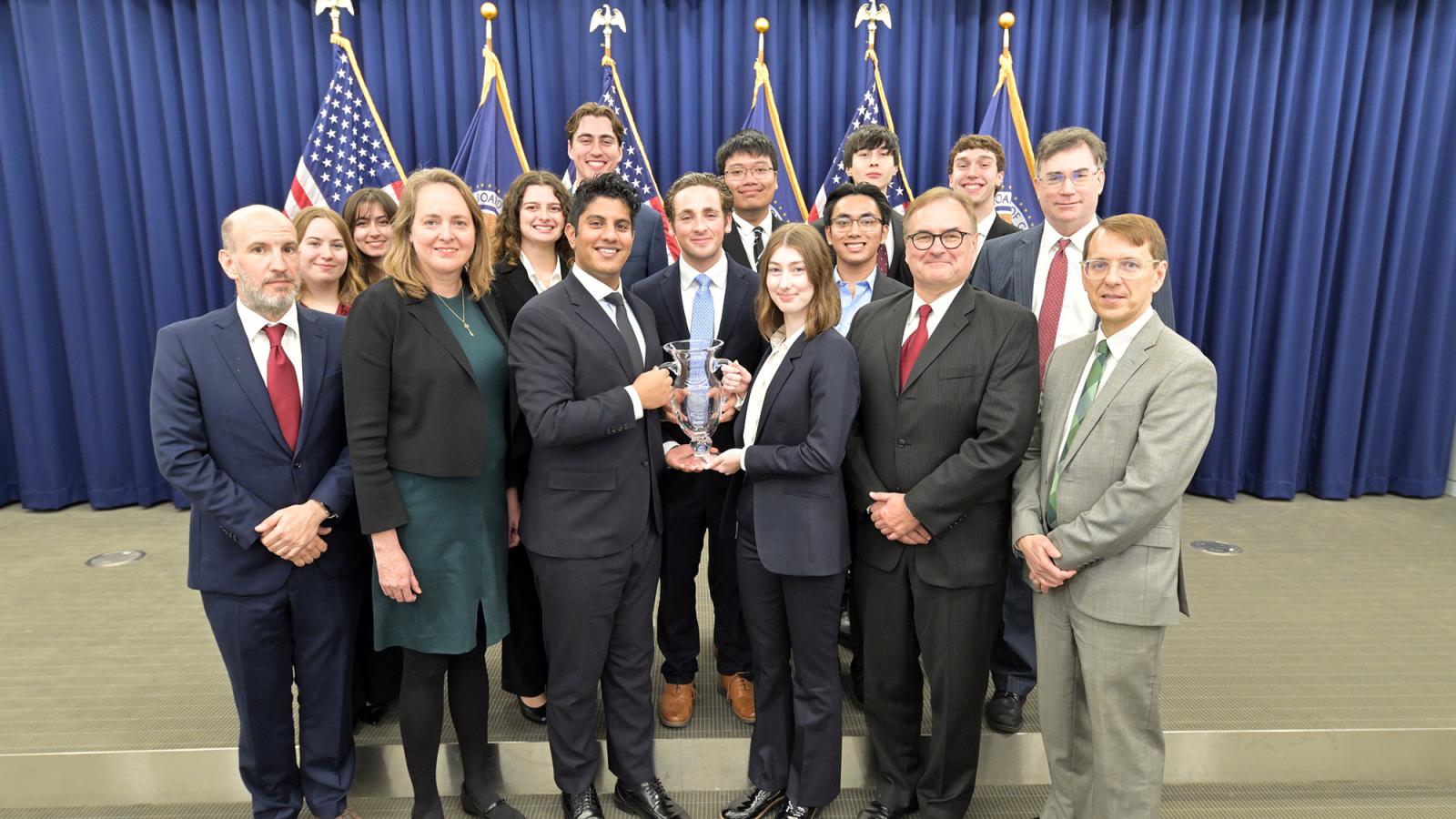
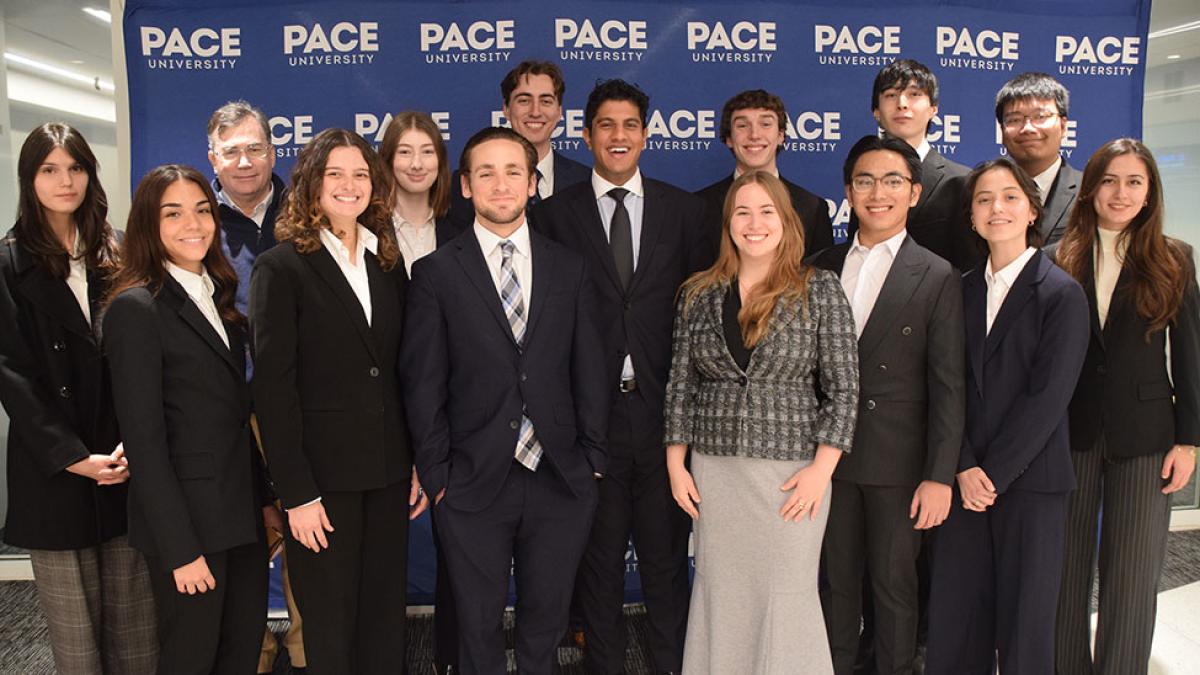
Pace University’s Federal Reserve Challenge team has a history of excellence.
This past year marked the 22nd annual College Federal Reserve Challenge national championship and Pace’s sixth win since 2014, a record-breaking achievement for the University that routinely outperforms teams from top Ivy League schools.
The win means a lot to team captain Suraj Sharma ’26, a BA in Economics and MS in Economic Analysis and Data Science student. Why? Because the Federal Reserve Challenge Team (Fed Team, as Suraj calls it) is central to his Pace story. “I chose Pace because of Fed Team,” he says. “I had offers from Fordham and Stony Brook, but Pace understood something they didn’t: the era of the 4.0 GPA guaranteeing you a job is over. Now it’s about networking, real-world experience, and alumni connections.”
But winning this year meant even more to Suraj—because it was his final chance to win before graduating.
The Federal Reserve Challenge is a high-level battle of brains, poise, and policy under pressure. Yet most people have no idea what it actually entails.
...Pace understood something they didn’t: the era of the 4.0 GPA guaranteeing you a job is over. Now it’s about networking, real-world experience, and alumni connections.
So, what is the Fed Challenge? How do teams compete? And why is it so important?
Suraj admits that ‘what is the Federal Reserve Challenge’ is the most common question people ask. The Federal Reserve is the U.S.’s central bank that makes decisions on interest rates with the goal of keeping both unemployment rates and inflation low. “Really, their goal is to facilitate a better economy for all Americans,” says Suraj.
Considering the great importance of the Federal Reserve, training a new generation of professionals to navigate these costly decisions is paramount. At this annual competition, college students make a policy recommendation to Federal Reserve officials. “Essentially, we get to say ‘here’s what we think you should do with interest rates, with your balance sheet, and here’s why’,” explains Suraj. “We go through everything—GDP, unemployment, inflation, the financial system—and justify whether we recommend a cut, a hike, or a pause.”
Getting into the actual details of their approach is tricky. After all, Pace has won more times than any other school in the country, and other teams may well be reading for tips. But for a glimpse into what a presentation looks like, check out their winning presentation and Q&A:
Though it is an economic challenge, the Federal Reserve Challenge goes beyond spreadsheets and numbers. “Honestly, the data analysis part—spreadsheets, Excel—is maybe fifteen percent of the job,” Suraj admits. “The rest is soft skills: public speaking, collaboration, compromise, negotiation.”
It's a tough challenge, and this year featured one of the most stacked rosters to date, with nearly 140 universities competing. Teams present regionally and the best arguments move onto the national stage, where only six finalists engage in a Q&A with senior research economists in the Federal Reserve Building in Washington, DC.
For Suraj, being physically there in the building brought it all home.
It was an unforgettable experience being in a room of such decision-making and power.
“I got to sit in the same chair as Chairman Powell. My colleagues sat in the same chairs as the Federal Open Market Committee that decides where interest rates are going to go,” he says. “It was an unforgettable experience being in a room of such decision-making and power.”
The final presentation is the culmination of months of hard work, long nights, and tireless debate. The team begins preparing in the summer and works through the fall semester, studying on weekends, vacations, and holidays. “There were a lot of nights when we were up until dawn.” As a commuter student, Suraj especially felt those long nights. “But that’s our work ethic, and we think it defines our success. We work for it.”
Another element of the team’s preparation is their faculty mentorship, which Suraj describes as crucial. "I’m incredibly thankful for Professor Gregory Colman, our advisor,” he says. “Also professor Mark Weinstock—he originally built the team to what it is now. These days, he plays more of a supporting role, but he’s still very involved. He attended many practices and Q&A sessions.”
Fed Team provides opportunities to everyone, we’re proof of that.
Overseeing the entire economics department, and the Fed Team, is the professor and chair of the economics department, Anna Shostya, PhD. “Her unwavering support has been everything,” Suraj explains. “From funding to academic support—making arrangements for our DC trips or extensions on assignments—she makes it all possible.”
And those connections have paid off. Because of his time on the team, Suraj interned at both JPMorgan and PIMCO and will be returning to PIMCO full-time after graduation. His experience reflects a broader pattern: Fed Team alumni often land roles on Wall Street, and their referrals carry serious weight.
Suraj’s success didn’t come without personal sacrifice. He describes missing birthdays and weddings, preparing and practicing while grieving through the death of a family member—even surviving a hit-and-run accident from a drunk driver just a week before nationals. But he came to Pace for Fed Team and he wanted to see it through.
He wanted to win.
These moments underscore what the competition demands of its competitors. It goes beyond understanding macroeconomics and tests teams’ discipline, resilience, and their ability to communicate under pressure.
For Suraj, this year’s win isn’t just a reflection of his (and the team’s) hard work, but of something bigger and more aspirational.
We reflect the best of what this country can be.
“I’m a first-generation kid, my parents came from India,” he explains. “Fed Team provides opportunities to everyone, we’re proof of that. Our team has many immigrants and international students, and they work incredibly hard. Half our team is women. Most economics departments at other schools across the country can’t say that.”
Suraj’s pride in Fed Team, in Pace, and in New York City is no small part of his story. “We reflect the best of what this country can be,” he says. “We’re New York City. We’re the city of immigrants and dreams. And I’m proud to represent that. I’m proud to be American, and I hope future generations still have the same opportunities.”
Learn more about Pace’s Economics Department and the Federal Reserve Challenge Team and Competitions.
More from Pace Magazine
Fifty students. Six sessions. One life-changing experience. As the Center for Leadership and Emotional Intelligence wraps its inaugural program, leaders from across Pace reflect on its impact and share their vision for the future.
When Joseph Benfield ’91, Kathy-Ann Edwards ’93, and Franklyn Smith ’89 arrived at Pace from across the Caribbean, they found more than an education—they found a community that believed in them. Today, they are channeling that shared experience into meaningful impact, establishing a scholarship that honors their journey and invests in the future of Caribbean and Black business students at Pace.
Named one of the Top 50 Undergraduate Business Professors in the nation, Jessica Magaldi, JD, connects law to what students care about by building courses (and relationships) rooted in meaning, relevance, and real-life learning.
Mark Brown Establishes Leadership Endowment to Support Future Student-Athletes
For 14 years, Mark Brown has led Pace Athletics with heart, purpose, and a deep commitment to student success. Now, through a planned gift, he’s ensuring that support continues for generations of Setters to come.
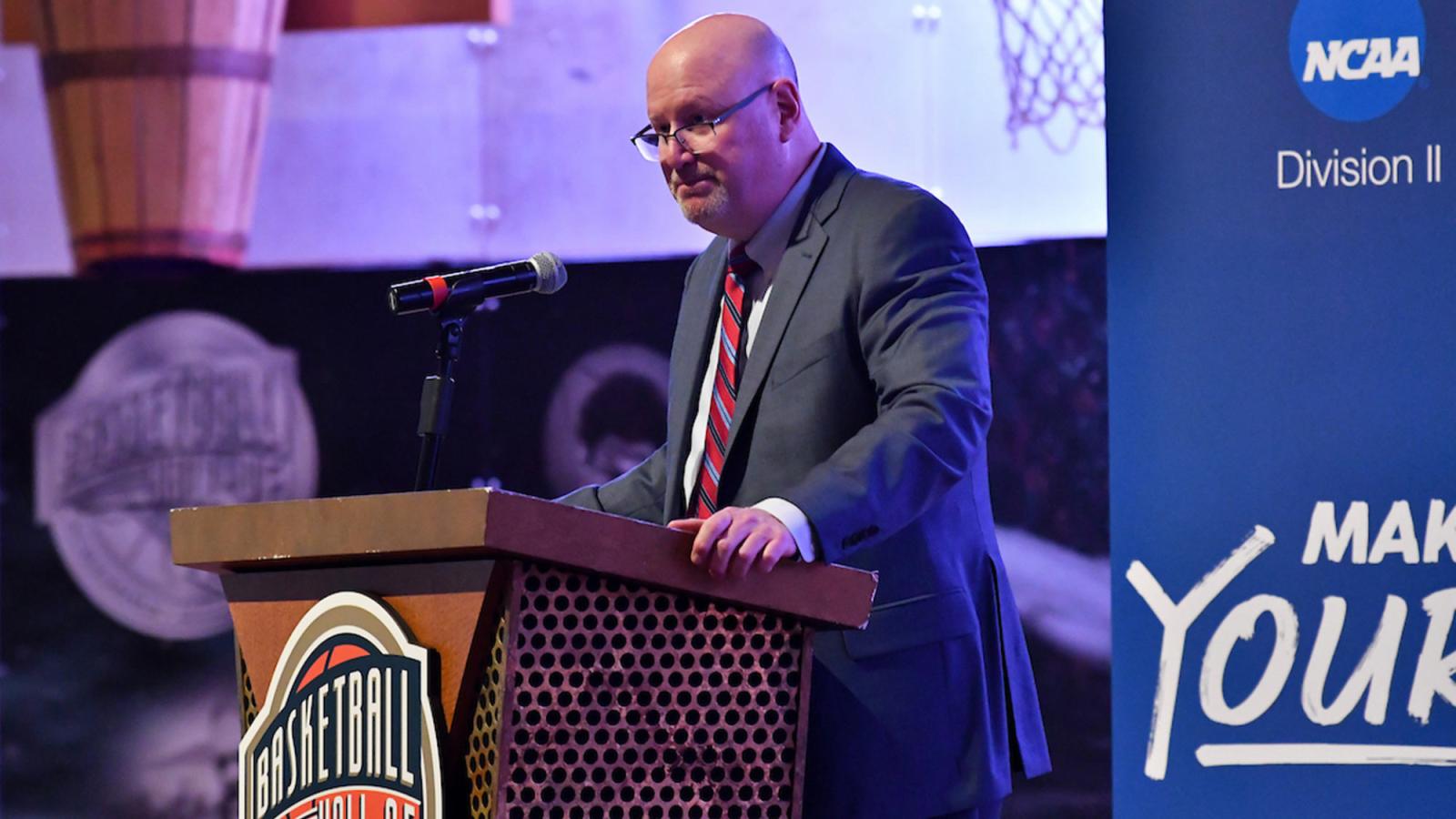
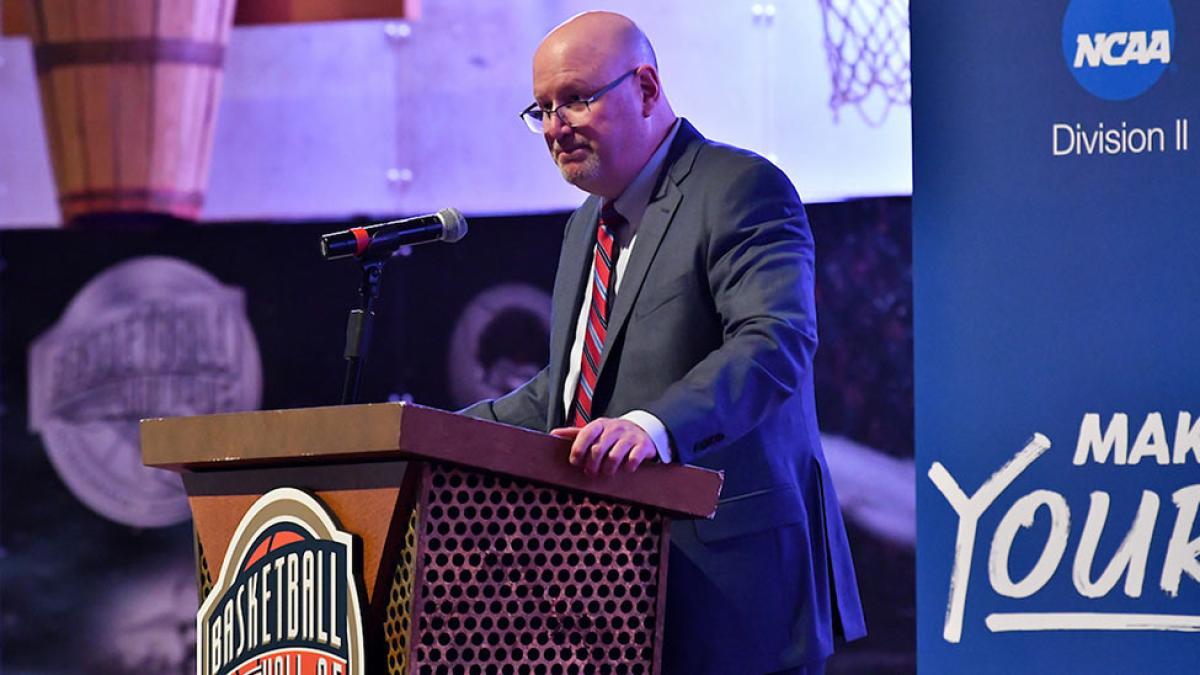
For 14 years, Mark Brown has served as Pace University’s Director of Athletics, the kind of leader whose presence becomes woven into the fabric of a campus. He has been there for championship runs and unforgettable seasons, for the electric moments that lift a stadium to its feet, and the quieter ones that shape a student’s future. Through it all, Mark has kept one belief at the center of his work: that the real victory comes from knowing he’s made a lasting difference in the lives of Pace student-athletes.

That belief is what led him to take a step that reaches far beyond his own time at the University. Mark recently established the Mark R. Brown Athletics Leadership Fund, a planned gift through his estate that will support student-athletes for generations to come. It is a gesture rooted in gratitude, service, and the deep sense of purpose that has defined his Pace career.
“I am choosing to make this commitment to Pace because Pace made a commitment to me 14 years ago,” he says. “In my role, I know I am making an impact in the lives of students, and I find that immensely satisfying. I could not imagine doing anything else at any other place. Pace has become my family.”
Pace has become my family.
Before he ever set foot on the Pleasantville Campus, Mark had already built an impressive resume, spending 18 years as an associate athletic director at Old Dominion University in Virginia. But when the opportunity to lead Pace Athletics came along, it arrived at a moment when he was searching for something more personal and grounded. He was ready to step away from the scale of Division I and into a Division II environment where he could see the impact of his work up close.
Pace offered exactly that. Its mission of Opportunitas resonated deeply with him, particularly as a first-generation college student who understood just how life-changing an open door can be. The students he met reminded him of himself: ambitious, hardworking, and searching for a place that believed in their potential. The campus, too, felt familiar, calling to mind the rural Vermont town where he grew up.
“Every person I met on campus was so kind and authentic, and I could really tell how much they cared about the students and this community,” Mark recalls. “I felt, and continue to feel, a genuine warmth that is hard to describe.”
Every person I met on campus was so kind and authentic, and I could really tell how much they cared about the students and this community.
Since joining Pace, Mark has guided the department through one milestone after another. Four years ago, he became the longest-tenured athletic director in the Northeast 10 Conference. Under his leadership, the University has seen notable growth in enrollment and academic success, as well as a surge in donor participation and support. He played a central role in developing a multi-million-dollar master plan for athletic facilities, a plan that came to life through projects such as the 14,010-square-foot Joseph R. Ianniello Field House, significant upgrades to Northwell Stadium and Peter X. Finnerty Field, and other enhancements designed to elevate the student-athlete experience.
Perhaps most meaningful to him has been the rise in academic achievement. During the 2024-25 season, Pace Athletics posted a cumulative 3.42 GPA with 78.6 percent of the department earning a spot on the NE10 Academic Honor Roll, the third-highest total in the conference.
So, when Mark decided to take the next step in supporting the students he has dedicated his career to, he chose to make his estate gift through his retirement plan. Working closely with Pace’s philanthropy team, he found an approach that allowed him to honor the University’s mission now while creating a permanent source of support for generations of Setters to come.
Because I feel so fortunate, I feel it is only appropriate to share my good fortune in as many ways as I can.
The process, he notes, is far easier than people often assume. Naming Pace as a beneficiary of a retirement plan or IRA can be done with a simple one-page form, no need to revise a will or trust, and no attorney fees involved. And because retirement assets left to the University are not taxed as income, individuals can make a significant impact without diminishing the value of their gift.
Mark never experienced a Pace education himself, but he has witnessed its power repeatedly over the past 14 years, seeing how it changes students, uplifts families, and strengthens communities. He hopes that his own commitment encourages others to consider the role they might play in supporting tomorrow’s student-athletes.
“I feel incredibly blessed to have found an occupation that I find so meaningful,” he says. “Because I feel so fortunate, I feel it is only appropriate to share my good fortune in as many ways as I can. I'm not a guy who has to live in the largest house or drive the newest car; I get profound satisfaction from being a servant leader and helping other people become successful. I feel incredibly blessed and proud to be able to make this commitment to a place that has become so special to me.”
You can join Mark in extending opportunities to future Pace students through a gift in your estate plan. Contact Marc Potolsky at (212) 346-1619 and mpotolsky@pace.edu to learn more.
More from Pace Magazine
Pace Athletics celebrated five outstanding alumni during the 2025 Hall of Fame Brunch on Homecoming Weekend. From record-breakers to program builders, these Setters left their mark and now take their place in Pace history.
From homes around the world to a new life in Blue and Gold, international student-athletes at Pace face more than competition—they navigate culture, language, and independence.
Pace student-athletes dominated the 2025 fall season with standout performances and postseason honors across five sports. From record-breaking veterans to breakout first-years, these Setters went all in and brought the accolades home.
International Student-Athletes Finding Their Place at Pace University
From homes around the world to a new life in Blue and Gold, international student-athletes at Pace face more than competition—they navigate culture, language, and independence.
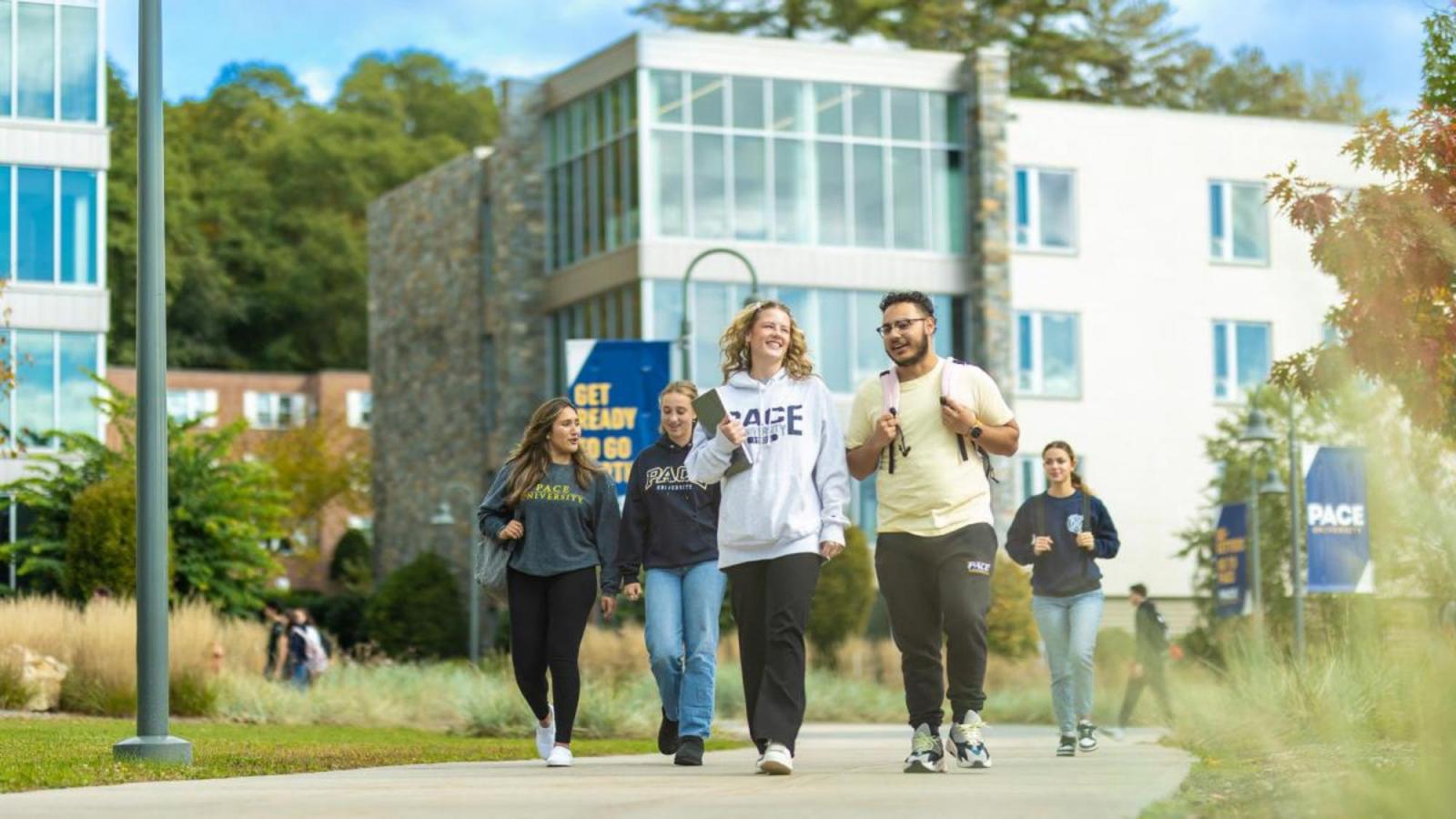
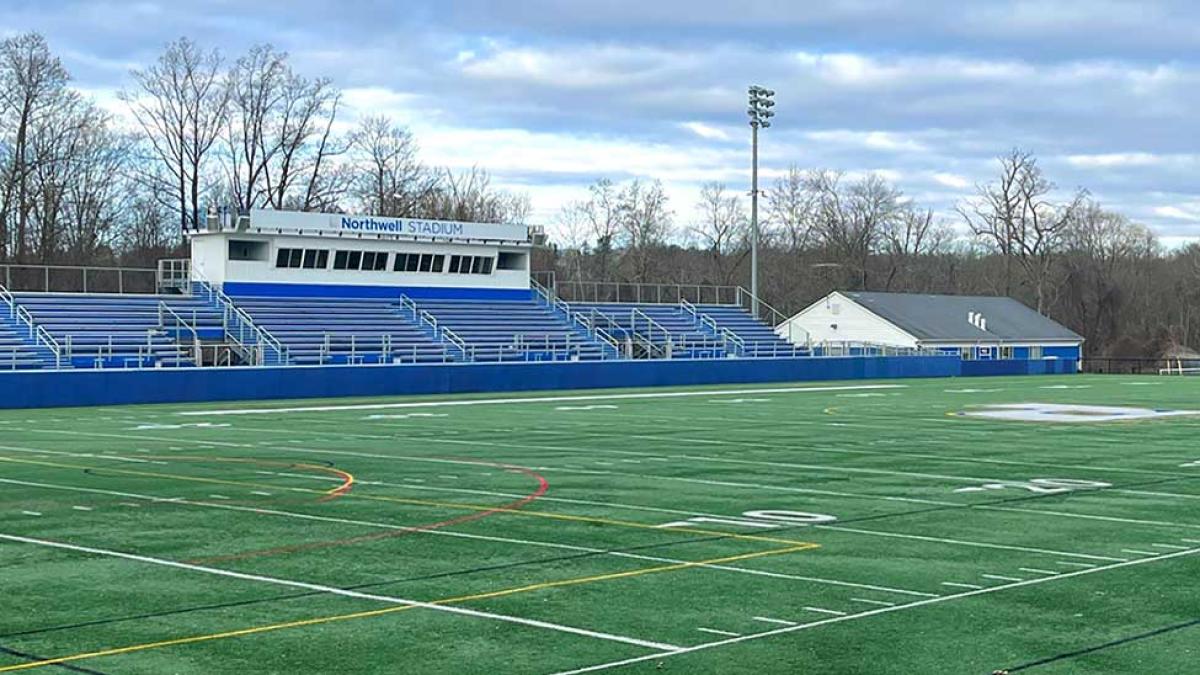
For many international student-athletes, the decision to leave home and compete in the NCAA is as much a leap of faith as it is a pursuit of opportunity. At Pace University, that leap brings students from across the globe into a demanding environment that blends Division II athletics, rigorous academics, and the everyday realities of adapting to life in a new country. While each journey is different, the shared experience of transition, adjustment, and growth has become a defining part of the international student-athlete story within the Blue and Gold.

Each year, Pace welcomes student-athletes who arrive with years of preparation in their sport and a willingness to challenge themselves beyond competition. What many quickly discover is that success is shaped as much by what happens away from the field, pool, or pitch as it is by performance. New academic expectations, cultural differences, language nuances, and distance from home all play a role in shaping the international student-athlete experience.
Among those navigating that transition are Ben Dunkerley, Feline Rook, Javier Cisternas-Gomez, and Eugenia Morossi. While their sports and backgrounds differ, their experiences reveal common themes of resilience and personal growth.
For many international student-athletes, the first weeks on campus are the most challenging. Everything feels unfamiliar, from classroom dynamics to daily routines and communication. Ben Dunkerley, a defender on the men’s soccer team from North Yorkshire, England, described that adjustment as more complex than he expected. “You come here thinking the hardest part will be the soccer,” he said. “But it’s really everything around it that takes time—how classes work, how people communicate, even small things like daily routines.”
"Living far from home has changed me a lot as a person. I’ve become more independent, more mature, and more confident in my decisions." —Rook
The distance from home was one of the biggest challenges Dunkerley faced early on. “At 18, the hardest part was moving away from your parents,” he explained. “It’s a good seven-hour flight to get back home, and then you’re dealing with the time difference. When I’m free in the evening, it’s midnight back home, so communication becomes really difficult.” Learning to manage that separation while living independently forced him to mature quickly. “Cooking for yourself, doing laundry, staying on top of soccer and school—it speeds up that maturity process,” he said.
Dunkerley arrived at Pace with a strong soccer foundation developed through England’s club system and years of competing at a high level. Even with that experience, adapting to the American collegiate model required adjustment. “College sports aren’t really a thing back home in the same way,” he said. “Here, every game means so much because the season is shorter. You’re playing twice a week, training almost every day, and you really have to look after your body.” Over time, structure and support helped him find stability. “Once you settle in, you realize you’re not doing it alone,” he said. “That’s when it really starts to feel like home.”
“You come here thinking the hardest part will be the soccer. But it’s really everything around it that takes time—how classes work, how people communicate, even small things like daily routines.”—Dunkerley
That sense of support and belonging is echoed across Pace Athletics, particularly among first-year international students like Feline Rook. A midfielder on the field hockey team from the Netherlands, Rook came to Pleasantville seeking an opportunity that was difficult to find at home. “I came to Pace because here I have the opportunity to focus on both my academics and playing field hockey at the same time,” she said. “In my country, it’s really hard to combine those two.”
The move was exciting, but far from easy. “My biggest challenge here is living far away from my friends and family,” Rook said. “You can’t just go home for a weekend, and the time difference makes staying in touch more challenging.” Even though she spoke English before arriving, adjusting to a new academic environment in a second language took time. “At first, studying in a different language and a different country was hard and challenging for me,” she said. “But now I’ve gotten used to it, and I feel like I’ve grown academically since I’ve come here.”
Rook credits her teammates and coaches for helping her find confidence both on and off the field. “The atmosphere here was great right away,” she said. “The people I’ve met and the support I’ve had really changed me as a person and as a player.” Her success in her first season—earning Rookie of the Week honors and All-Conference recognition—reinforced that growth. “Those achievements reflect all of the hard work I’ve put into adjusting to a new country, a new team, and a new level of competition,” she said.
“The people I’ve met and the support I’ve had really changed me as a person and as a player.”—Rook
Academics present another layer of transition for international student-athletes, especially when paired with the physical demands of Division II competition. For Javier Cisternas-Gomez, a freshman swimmer from Santiago, Chile, learning to balance those responsibilities was essential. “Everything moves fast here,” he said. “You have practices early in the morning, classes during the day, and studying at night. You learn quickly how important time management is.”
Leaving home was the most difficult part of his transition. “The biggest challenge was leaving my family, my dogs, my friends and changing to a completely different language and culture,” he said. “Feeling far from home is the hardest part.” Despite that distance, he found comfort within the team environment. “Here, the vibe feels more like a family,” he said. “That helps a lot.”
Over time, Cisternas-Gomez began to feel more settled. “Right now, I feel like I’ve found an equilibrium,” he said. “I feel like I have a route to accomplish my goals, and that makes me feel confident. You just have to keep going and stay focused.” He encourages future international student-athletes to embrace the challenge. “I know it’s scary, but it’s worth it,” he said. “If you come with a purpose and clear goals, you’re going to be fine.”
"I feel like I have a route to accomplish my goals, and that makes me feel confident."—Cisternas-Gomez
For Eugenia (Gigi) Morossi, a sophomore swimmer from Milan, Italy, the decision to come to the United States was driven by the opportunity to combine elite athletics with higher education. “In Italy, you usually have to choose—you either choose sport or you choose school,” she said. “Here, I can do both, and that’s why I wanted to come.”
Even with that motivation, the transition was overwhelming at first. “I thought I was independent before coming here,” Morossi said. “But then I moved here, and it was kind of shocking. At the beginning, you think, ‘What do I do? Why am I here?’” She described the experience as isolating despite being surrounded by teammates. “You’re not alone, but you feel like you have to deal with everything by yourself.”
That feeling gradually shifted as she became more comfortable within the program. “After some time, it’s like a whole new chapter of your life opens,” she said. “Now I feel completely different from my first year. Even my personality changed.” Morossi also noted one of the biggest differences between European and American sports culture. “In Europe, you’re always competing for yourself,” she said. “Here, I really learned what it means to be part of a team. Even if I don’t love my time in a race, if I score points for the team, I find a reason to be happy.”
"Here, I really learned what it means to be part of a team."—Morossi
As the months pass, many international student-athletes experience a noticeable shift. What once felt unfamiliar begins to feel routine. Classrooms become more comfortable, friendships deepen, and campus life starts to feel like home. “There’s a point where you stop counting the days and just start living,” Cisternas-Gomez said. “That’s when you really feel like you belong.”
That sense of belonging often leads to growth beyond athletics. Living independently in a new country fosters maturity, confidence, and perspective. “Living far from home has changed me a lot as a person,” Rook said. “I’ve become more independent, more mature, and more confident in my decisions.” Dunkerley echoed that sentiment, adding, “It’s made me stronger as a person, not just as an athlete.”
"It's like a whole new chapter of your life opens."—Morossi
International student-athletes bring more than athletic ability to Pace University. They bring new perspectives shaped by where they come from and what they have experienced. Those differences show up in locker rooms, classrooms, and everyday conversations, helping teammates and peers learn from one another and build connections.
For Pace Athletics, supporting international student-athletes goes beyond competition. It means helping them adjust to life in a new place, grow more confident, and learn how to stand on their own so far from home. As these Setters continue to build their lives thousands of miles from where they began, their stories reflect what it means to be an international student athlete. In representing Pace University, they are also building experiences and perspectives that will stay with them long after their time in the Blue and Gold.
More from Pace Magazine
Pace Athletics celebrated five outstanding alumni during the 2025 Hall of Fame Brunch on Homecoming Weekend. From record-breakers to program builders, these Setters left their mark and now take their place in Pace history.
Pace student-athletes dominated the 2025 fall season with standout performances and postseason honors across five sports. From record-breaking veterans to breakout first-years, these Setters went all in and brought the accolades home.
For 14 years, Mark Brown has led Pace Athletics with heart, purpose, and a deep commitment to student success. Now, through a planned gift, he’s ensuring that support continues for generations of Setters to come.
Pace Athletics Honors 2025 Hall of Fame Class at Annual Induction Brunch on Homecoming Weekend
Pace Athletics celebrated five outstanding alumni during the 2025 Hall of Fame Brunch on Homecoming Weekend. From record-breakers to program builders, these Setters left their mark and now take their place in Pace history.
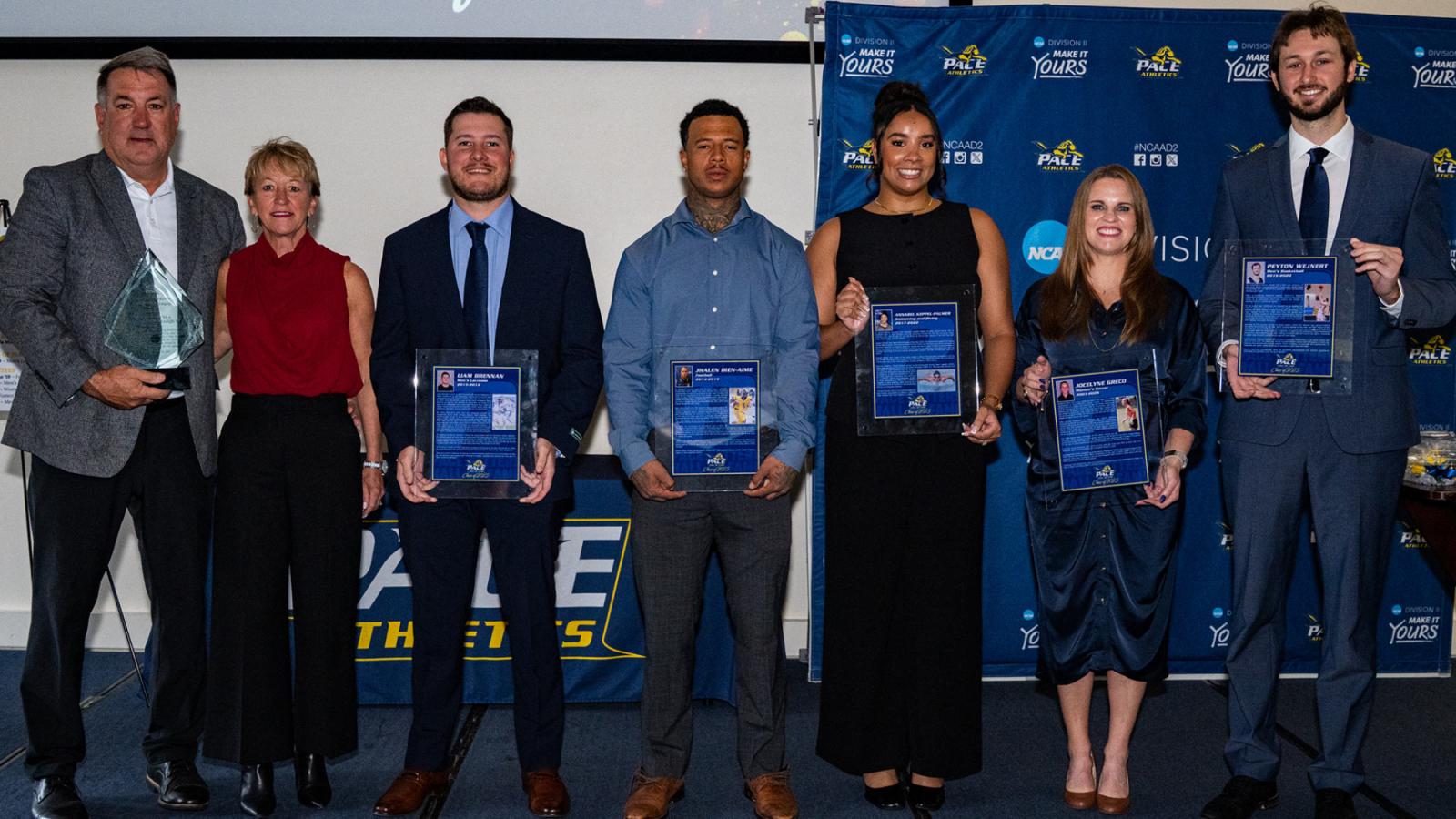
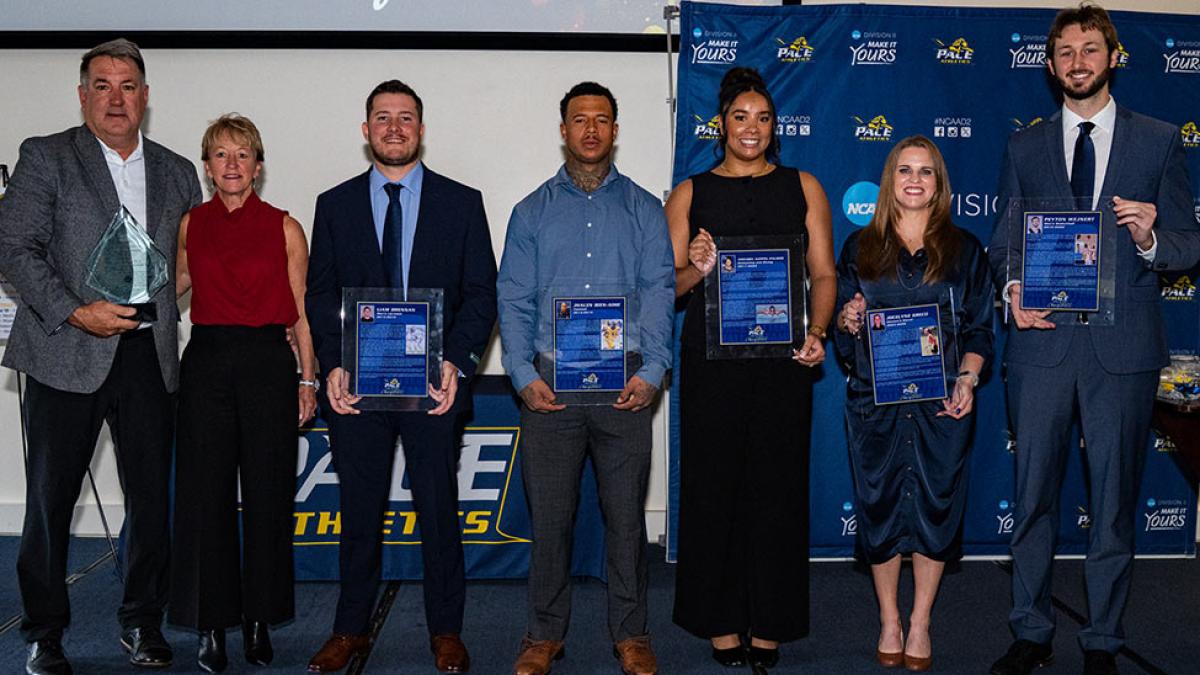
Pace University proudly welcomed five new members into the Athletics Hall of Fame during the 2025 Hall of Fame Brunch and Awards Ceremony presented by Northwell Health. The annual event, a highlight of the University’s Homecoming Weekend, brought together alumni, families, coaches, current student-athletes, and longtime supporters to recognize individuals whose achievements and contributions have left a lasting imprint on Setter Athletics.

Homecoming Weekend featured a full slate of athletic competition, including women’s soccer, football, men’s soccer, and volleyball, but the Hall of Fame Brunch served as the weekend’s signature moment. From the opening remarks through the closing group photo, the ceremony emphasized the history and tradition of Pace Athletics.
Director of Athletics Mark Brown began the program by welcoming the audience and speaking to the significance of the Hall of Fame. He noted the impact each inductee has had on their program and the role they played in elevating Pace Athletics as a whole. His remarks set the tone for a celebration focused not only on athletic accomplishments but also on character, leadership, and the enduring influence of former student-athletes.
The 2025 Hall of Fame Class encompassed a wide range of programs and competitive eras, showcasing the depth of excellence within Pace Athletics.
Serving as emcee, longtime Pace athletics supporter Tim McCaffery guided the ceremony and introduced the members of the 2025 Hall of Fame Class. Each honoree was featured in a personalized tribute video highlighting memorable moments from their time as student-athletes before taking the stage to address the audience.
The 2025 Hall of Fame Class encompassed a wide range of programs and competitive eras, showcasing the depth of excellence within Pace Athletics.
Jhalen Bien-Aime '19, football, was recognized for his transformative impact on the football program. A two-time All-NE10 selection, Bien-Aime graduated as the program’s all-time leader in rushing touchdowns and was instrumental in revitalizing Pace Football during his career.
Liam Brennan ’18, men’s lacrosse, joined the Hall of Fame as one of the most productive offensive players in men’s lacrosse history. Brennan earned multiple All-NE10 and All-America honors and played a central role in elevating the program to national relevance.
While Homecoming Weekend featured competitive excitement across campus, the 2025 Hall of Fame Brunch offered a meaningful opportunity to honor the individuals whose achievements have helped build Pace Athletics.
Jocelyne Greco ’07, women’s soccer, known for her leadership along the back line, was honored for her defensive consistency during one of the strongest eras in women’s soccer. Her contributions helped set a foundation for the program’s long-term success.
Annabel Keppel-Palmer ’22, women’s swimming and diving, became one of the most decorated swimmers in program history during her career at Pace. Her record-setting performances and multiple NE10 medals helped redefine the competitive standard of the swimming program.
Peyton Wejnert '20, men's basketball, was inducted after a standout career in which he surpassed 1,700 career points and earned multiple All-Region honors. His scoring ability and leadership contributed significantly to the resurgence of the men’s basketball program.
Before the introduction of the new class, the University recognized an additional milestone achievement. Dr. Marcus Mayus, a 2000 graduate and 2012 Pace Athletics Hall of Fame inductee, was honored for his recent enshrinement into the Northeast 10 Conference Hall of Fame. Mayus’ collegiate career remains one of the most celebrated in Setter history, highlighted by honors including NE10 Player of the Year, ECAC Player of the Year, and USILA Midfielder of the Year, as well as conference regular season and tournament championships.
The moment served as a visual reminder of the tradition of excellence that continues to shape the University’s athletic programs.
Following a mid-morning brunch intermission, the program continued with the presentation of the Peter X. Finnerty Leadership Award, named for Pace’s founding Director of Athletics. The 2025 recipients, Jerry McAuliffe and Brenda MacAdam McAuliffe, were honored for their extensive contributions to the University, including scholarship support, alumni leadership, and mentorship. Their establishment of the Brenda and Jerry McAuliffe Endowed Scholarship, which benefits accounting students who are also student-athletes, reflects their ongoing dedication to fostering academic and athletic excellence at Pace.
As the formal recognitions concluded, the ceremony closed with final remarks from McCaffery and a group photograph of past and present Hall of Fame members. The moment served as a visual reminder of the tradition of excellence that continues to shape the University’s athletic programs.
While Homecoming Weekend featured competitive excitement across campus, the 2025 Hall of Fame Brunch offered a meaningful opportunity to honor the individuals whose achievements have helped build Pace Athletics. Their contributions now stand as part of the University’s history, shaping a tradition that continues to grow with each new generation of Setters.
More from Pace Magazine
Pace student-athletes dominated the 2025 fall season with standout performances and postseason honors across five sports. From record-breaking veterans to breakout first-years, these Setters went all in and brought the accolades home.
For 14 years, Mark Brown has led Pace Athletics with heart, purpose, and a deep commitment to student success. Now, through a planned gift, he’s ensuring that support continues for generations of Setters to come.
From homes around the world to a new life in Blue and Gold, international student-athletes at Pace face more than competition—they navigate culture, language, and independence.
Fall Sports Shine with All-Conference and All-Region Honors
Pace student-athletes dominated the 2025 fall season with standout performances and postseason honors across five sports. From record-breaking veterans to breakout first-years, these Setters went all in and brought the accolades home.


Pace University Athletics enjoyed a highly decorated 2025 fall season, with student-athletes across five sports earning postseason accolades. In total, 17 Setters received Northeast 10 (NE10) All-Conference recognition, and 3 were selected to All-Region teams, highlighting a stellar autumn for Pace’s women’s volleyball, football, men’s soccer, women’s soccer, and field hockey programs. The awards display a blend of veteran leadership and emerging talent that fueled each team’s success on the field.
In head coach Chad Walker’s first season at the helm, the Setters football team saw five players earn spots on the NE10 All-Conference Teams. Graduate wide receiver Elizjah Lewis, second-year student punter Decker McNally, and third-year student return specialist Jhamier Howard each earned First Team All-Conference honors, while third-year student linebacker Travis Osterhout and graduate defensive back Ibrahim Diallo were named to the Second Team. Lewis capped his Pace career with a conference-leading 10 touchdown receptions and 797 receiving yards, emerging as one of the NE10’s most explosive offensive weapons. On special teams, McNally led the conference in punting, averaging over 40 yards per punt and, and Howard was a game-changing kick returner with two touchdowns of 95+ yards during the season.
Howard’s electrifying play also earned regional acclaim. Howard was selected to the Division II Conference Commissioners Association (D2CCA) All-Super Region 1 Second Team as a return specialist, placing him among the top playmakers in the entire region. He amassed 698 kickoff return yards with a stellar 33.2-yard average, forcing opponents to account for his speed and scoring two kickoff return touchdowns that ranked among the longest in the NE10.
Overall, the five All-Conference selections for Pace football in 2025 highlight the program’s depth, featuring record-setting offensive performances and a formidable special teams unit.
In total, 17 Setters received Northeast 10 (NE10) All-Conference recognition, and 3 were selected to All-Region teams.
Under the guidance of first-year head coach Brittany Soto, Pace women’s soccer enjoyed one of its most accolade-filled seasons ever. Six Setters earned NE10 All-Conference honors, highlighting one of the largest single-season totals in program history. Leading the way were forward Meredith Klosek and defender Milani Thompson, who each secured First Team selections and spots on the All-Rookie Team. Graduate forward Allison Carr was named to the Second Team, while forward Ava Viebrock and midfielder Andrea Flores garnered Third Team honors. Additionally, forward Bailey Olson joined Klosek and Thompson on the NE10 All-Rookie Team, emphasizing the immediate impact of Pace’s newcomers.
One of those first-year student stars, Milani Thompson, also earned national regional recognition. The Monroe Township, N.J. native was named to the United Soccer Coaches All-East Region Third Team, becoming the first Pace women’s soccer player to earn All-Region honors since 2022. Thompson anchored a back line that ranked among the NE10’s best and played every minute of all 18 matches, quickly establishing herself as one of the region’s top young defenders. She even contributed a goal and an assist in her debut season, showcasing two-way versatility. All-around, women’s soccer’s blend of veteran leadership and youth talent resulted in a balanced lineup that propelled the Setters to a standout campaign and an appearance in the NE10 postseason.
Pace women’s soccer enjoyed one of its most accolade-filled seasons ever.
Led by head coach Kayte Biordi, Pace field hockey continued its tradition of excellence with four Setters earning NE10 All-Conference accolades in 2025. Fourth-year midfielders Kyleigh Kearney and Sydney Sims, defender Molly Paterson, and first-year midfielder Feline Rook were all selected to the NE10 All-Conference Second Team, with Rook additionally named to the All-Rookie Team. This formidable group contributed across every phase of the game, from Kearney and Sims providing veteran leadership in midfield to Paterson anchoring the defense and Rook making an immediate impact in her first collegiate season.
Adding to the accolades, fourth-year student Molly Paterson earned a prestigious All-Region honor. Paterson was named to the National Field Hockey Coaches Association (NFHCA) Division II East Region Second Team, capping off her standout career with regional recognition. A stalwart on the back line, Paterson started all 19 games and logged over 1,150 minutes as the cornerstone of Pace’s defense. Her consistency against a demanding NE10 schedule was key to the Setters’ identity, as she led a defensive unit that shut down opponent attacks throughout the fall. Overall, Paterson and the rest of the squad’s honor reflect a well-rounded unit that featured both experience and fresh talent on their NE10 postseason run.
Led by head coach Amanda Alayon-Wilkins, Pace Volleyball’s youth movement paid dividends as first-year Kadence Ackmann was named to the NE10 All-Rookie Team following a stellar collegiate debut. The outside hitter emerged as one of the league’s most productive newcomers, tallying 214 kills, 193 digs, 23 blocks, and 258.5 points over 77 sets. Ackmann notched seven double-doubles—the highest total among Pace first-year students and one of the top marks for any NE10 rookie—showcasing her all-around impact on both offense and defense. Her consistent performance throughout the season earned her a well-deserved spot among the conference’s top first-year players.
A total of 17 Setters earned All-Conference honors, and three received All-Region awards for their performances.
In the first season of Pace Men’s Soccer since the program’s revival, junior forward Daniel Santos made history for the Setters under the guidance of head coach Edward Evans. Santos earned a place on the NE10 All-Conference Third Team, becoming the first Pace men’s soccer student-athlete to garner All-Conference honors since the sport’s return to competition after 30 years. His breakout campaign saw him lead the Blue and Gold offense with 6 goals and 3 assists (15 points) while starting all 18 matches. A clutch performer, Santos tallied two game-winning goals and consistently sparked the attack, firing 36 shots with 19 on target over the fall. His ability to create and convert opportunities under pressure earned the third-year student a well-deserved spot among the NE10’s best, signaling a bright future for the rebooted program.
Overall, the Fall 2025 season saw Pace University’s student-athletes garner an impressive collection of accolades across multiple sports. A total of 17 Setters earned All-Conference honors, and three received All-Region awards for their performances. These achievements showcase the exceptional amount of talent in Pace’s athletics and the University’s rising profile within NCAA Division II competition.
More from Pace Magazine
For 14 years, Mark Brown has led Pace Athletics with heart, purpose, and a deep commitment to student success. Now, through a planned gift, he’s ensuring that support continues for generations of Setters to come.
From homes around the world to a new life in Blue and Gold, international student-athletes at Pace face more than competition—they navigate culture, language, and independence.
Pace Athletics celebrated five outstanding alumni during the 2025 Hall of Fame Brunch on Homecoming Weekend. From record-breakers to program builders, these Setters left their mark and now take their place in Pace history.
Middle States Self-Study: Key Updates for the Pace Community
Every Pace degree carries a promise. Middle States accreditation helps ensure that promise endures. In this Q+A, Pace leader Nancy DeRiggi explains how the University is assessing its progress, planning ahead, and building momentum that benefits students and alumni alike.
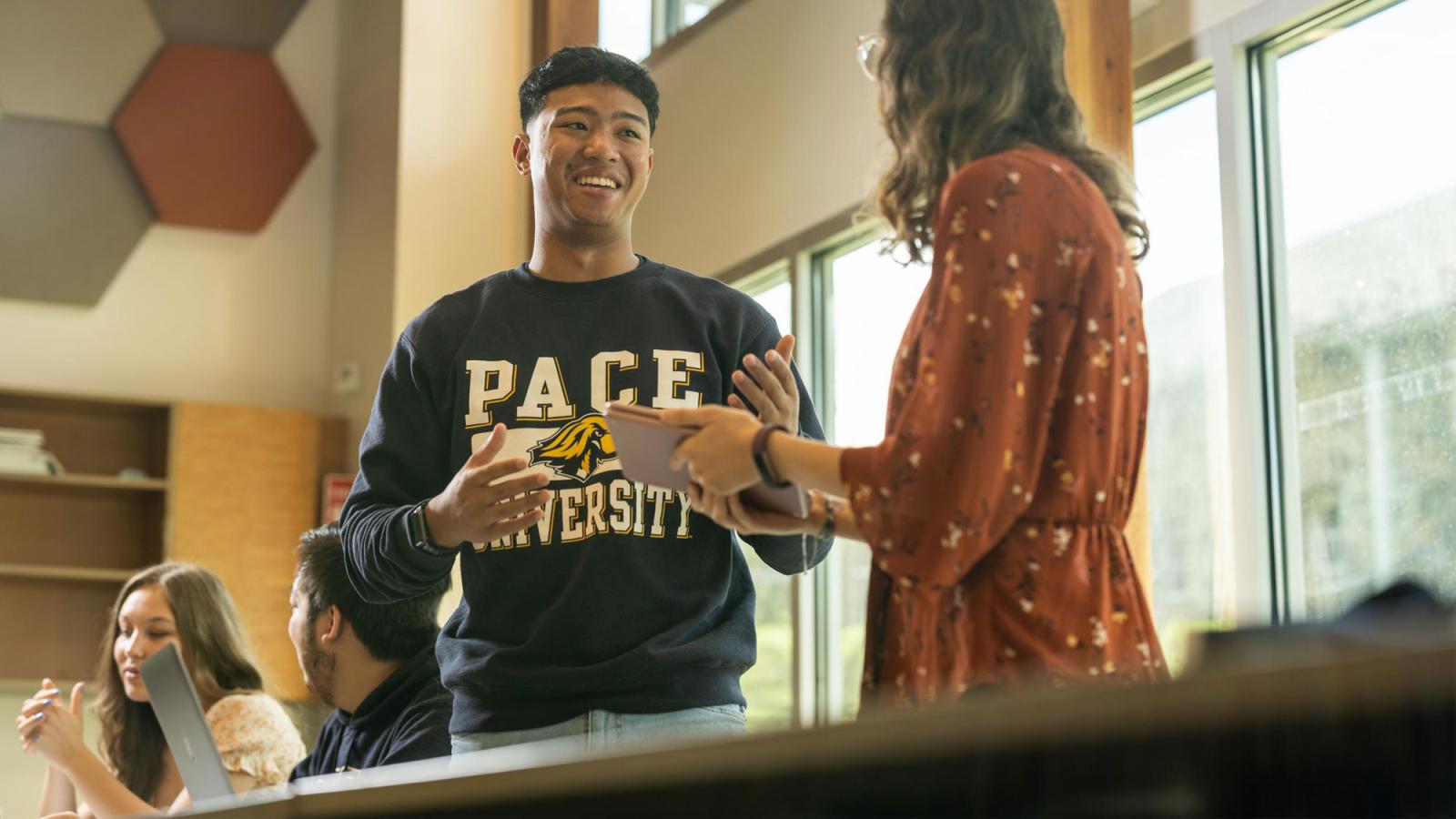
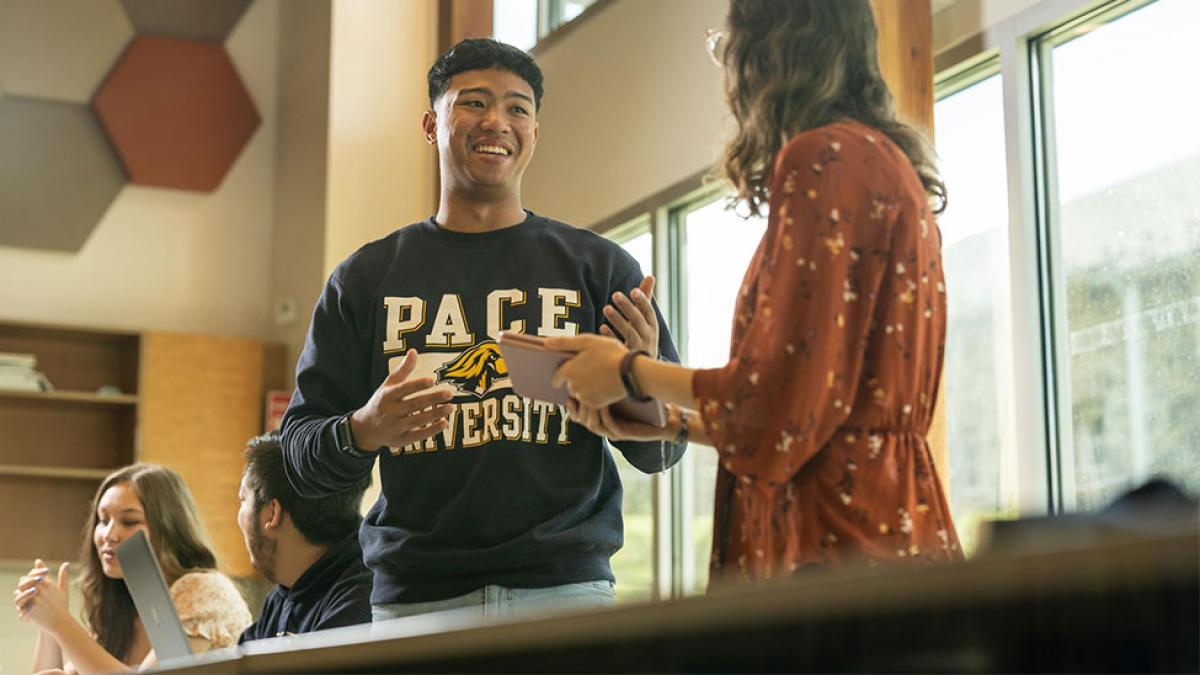
Every eight years, a university pauses, takes a deep breath, and asks itself some big, necessary questions: Are we doing what we say we do? Are we serving students as well as we can? Are we building something that will last?
That moment is called Middle States accreditation, and at Pace University, two leaders are helping lead the charge. While accreditation can sound technical, its impact is anything but. It’s what safeguards the value of a Pace degree, ensures access to federal financial aid, and holds the University to the highest standards of quality and accountability.
Nancy DeRiggi, associate vice president for Institutional Research, Accreditation, and Analytics, co-chairs Pace’s Middle States Self-Study Leadership Team. Simply put, the team is responsible for leading a comprehensive, honest review of the University’s academic and strategic priorities—and clearly communicating that story through evidence and data. They are coordinating a campus-wide effort involving more than 75 faculty and staff, all working together to help strengthen Pace’s future.
In the Q+A that follows, Nancy DeRiggi pulls back the curtain on what Middle States accreditation really means, where Pace is in the process, and how this work supports the momentum alumni see across the University today.
Pace Magazine: What is the purpose of Middle States accreditation, and why does it matter to Pace?
Nancy DeRiggi: Accreditation by the Middle States Commission on Higher Education (MSCHE) is essential to Pace’s mission and long-term success. It’s the formal process through which the University demonstrates that it delivers high-quality academic programs, provides strong support for students, and manages institutional resources responsibly. It also ensures the University’s ongoing eligibility for federal financial aid and affirms for students, families, alumni, and external partners that the University meets rigorous national standards.
The self-study also provides an important opportunity to reflect on how effectively Pace is fulfilling its mission and to identify areas where the University can further strengthen its work.
Pace Magazine: How does the work of the Office of Transformation connect to the Middle States self-study?
DeRiggi: The initiatives underway in the Office of Transformation are closely aligned with the expectations set forth in the Middle States Standards. The four work streams are producing recommendations and improvements that support institutional planning, assessment, resource allocation, student success, and long-term sustainability. The alignment also ensures that the University’s strategic priorities are reinforced through the self-study process.
Pace Magazine: What stage of the accreditation process are we in, and what comes next?
DeRiggi: Pace is currently in the core phase of preparing the written self-study. Seven working groups, each aligned with one of the Middle States Standards, are gathering evidence, drafting analyses, and identifying strengths and opportunities for improvement.
This work will continue through the spring as initial drafts are reviewed, refined, and aligned across Standards to ensure consistency and clarity. Later in 2026, the Executive Committee will begin synthesizing these submissions into a comprehensive self-study document. The University community will then have an opportunity to review and provide feedback, ensuring the final document reflects broad institutional input.
Pace Magazine: When should planning begin for the Middle States site visit?
DeRiggi: The Middle States site visit is scheduled for Spring 2027. Preparation for the visit will begin in Fall 2026 and will include informational sessions, opportunities for faculty, staff, and students to learn more about the visit, and guidance on how to engage with the evaluation team. The goal is to ensure that all community members feel informed and confident speaking about Pace’s mission, priorities, and progress. Additional details will be shared as the visit approaches.
Pace Magazine: Are there any other important updates the Pace Community should know?
DeRiggi: More than seventy-five faculty and staff members from across the University are actively participating in the self-study process. Their expertise and commitment are essential to advancing this work.
To support these efforts, the Executive Committee is collaborating with Human Resources to explore ways to recognize and sustain ongoing participation. Regular updates will continue throughout the process, along with opportunities for the Pace Community to remain engaged and contribute to the development of the final self-study report.
Learn more about the process by visiting Pace’s Middle States website.
More from Pace Magazine
Higher education is being reshaped by rapid change and leadership matters more than ever. This fall, we welcomed Ajay Khorana, PhD, as dean of the Lubin School of Business and Brian Goldstein, PhD, as dean of the College of Health Professions, two accomplished leaders whose expertise bridges academic rigor, industry insight, and student outcomes.
With 1.5 million TED Talk views, seven books, and a record of transformative academic leadership, Pace University’s newest provost is bringing bold ideas—and big energy—to campus.
Broadway stages. Global policy wins. A first-of-its-kind AI degree. Record-breaking generosity. And students leading real change—from healthcare and environmental advocacy to protecting New York’s wildlife. The Winter 2026 edition of "10 Things to Inspire You" captures just a snapshot of the momentum driving the Pace Community forward.
Welcoming Pace’s Next Provost: Alison Carr-Chellman, PhD
With 1.5 million TED Talk views, seven books, and a record of transformative academic leadership, Pace University’s newest provost is bringing bold ideas—and big energy—to campus.

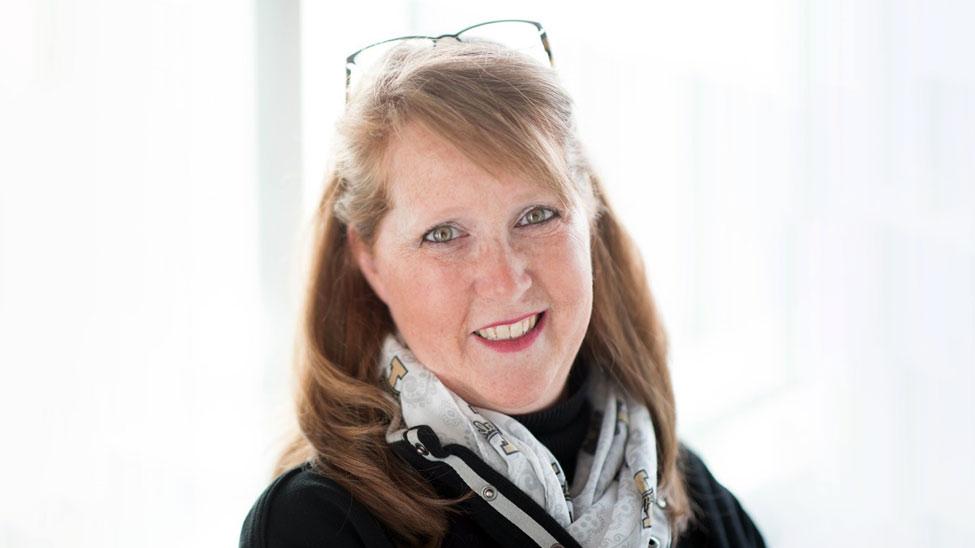
Following a national search, Pace University is pleased to announce that Alison Carr-Chellman, PhD, has joined as provost and executive vice president for academic affairs. A nationally respected scholar and seasoned leader in higher education, Carr-Chellman brings with her more than two decades of academic and administrative experience that spans teaching, research, and institution-wide innovation.
Her career reflects a deep commitment to academic excellence, shared governance, and the student experience. Her leadership has consistently focused on elevating institutional reputation while driving student outcomes and fostering inclusive learning environments.
At the University of Dayton, where she most recently served as dean of the School of Education and Health Sciences, she led a period of substantial strategic growth. She managed a $29 million budget, expanded research funding, and spearheaded initiatives to support equity, inclusion, and student success. Under her guidance, the school improved its national rankings and achieved a remarkable 100 percent job placement rate for undergraduates in teacher education and health sciences.
“Provost Carr-Chellman stood out in this search for her strength as a scholar, her clear and confident communication, and her ability to build strong relationships with faculty and academic leaders,” said Pace University President Marvin Krislov. “She brings a strategic vision shaped by a genuine commitment to student learning and institutional progress. We’re excited for the leadership she will bring as Pace continues to strengthen its academic reputation, expand scholarly productivity and support the success of our faculty, students, and programs.”
Joining at a Time of Momentum
Carr-Chellman’s arrival coincides with a dynamic chapter in Pace’s evolution. The University is currently transforming its Lower Manhattan campus at One Pace Plaza, expanding its academic offerings in high-demand fields, and investing in cutting-edge facilities, from an advanced Cyber Range and new artificial intelligence labs to a planned modernization of the Center for Healthcare Simulation in Pleasantville. Among these developments is the recent addition of undergraduate and graduate degrees in artificial intelligence, key to preparing students for the rapidly evolving workforce.
Carr-Chellman’s career path has prepared her well for this moment. Before her time at Dayton, she served as dean of the College of Education, Health and Human Sciences at the University of Idaho and spent over 20 years at Penn State University, where she held faculty and administrative roles. Her research has consistently explored systems thinking, instructional design, organizational change, and learning technologies.
A Distinguished Scholar and Advocate for Innovation
The author of seven books and more than 175 scholarly publications, Carr-Chellman has more than 14,000 citations on Google Scholar, a testament to the impact of her work. She has secured more than $8 million in external research funding, both as principal and co-principal investigator, and has lectured widely, delivering presentations in China, Norway, Brazil, France, Japan, and Qatar. Her TED Talk, “Gaming to Re-engage Boys in Learning,” has been viewed more than 1.5 million times.
Throughout her career, she has been known for her collaborative leadership style and her advocacy for broadening access to high-impact, student-centered learning experiences. Her portfolio includes major initiatives in program development, accreditation, online and hybrid education, experiential learning, and community-engaged scholarship.
“Pace has a unique mission rooted in access, excellence and opportunity, and that resonates deeply with me,” Provost Carr-Chellman said. “I’m excited to bring my experience in academic innovation, collaborative leadership and student-centered learning to a community so clearly dedicated to helping students excel and create lives they are proud of.”
Carr-Chellman holds a PhD in instructional systems from Indiana University Bloomington, as well as both a Master of Science in instructional systems and a Bachelor of Science in education from Syracuse University.
As provost, she will serve as Pace University’s chief academic officer, responsible for overseeing academic strategy, research development, faculty affairs, and major academic initiatives across the University’s campuses.
More from Pace Magazine
Higher education is being reshaped by rapid change and leadership matters more than ever. This fall, we welcomed Ajay Khorana, PhD, as dean of the Lubin School of Business and Brian Goldstein, PhD, as dean of the College of Health Professions, two accomplished leaders whose expertise bridges academic rigor, industry insight, and student outcomes.
Every Pace degree carries a promise. Middle States accreditation helps ensure that promise endures. In this Q+A, Pace leader Nancy DeRiggi explains how the University is assessing its progress, planning ahead, and building momentum that benefits students and alumni alike.
When Joseph Benfield ’91, Kathy-Ann Edwards ’93, and Franklyn Smith ’89 arrived at Pace from across the Caribbean, they found more than an education—they found a community that believed in them. Today, they are channeling that shared experience into meaningful impact, establishing a scholarship that honors their journey and invests in the future of Caribbean and Black business students at Pace.
The Rise of RADical Health: Bridging the Gap in Campus Wellness
At Pace, student well-being isn’t an afterthought. It’s built into the experience. RADical Health, a nationally recognized, peer-led wellness program, is helping students build resilience, connection, and confidence before challenges escalate. Discover how the program is transforming lives, strengthening teams, and setting Pace apart.
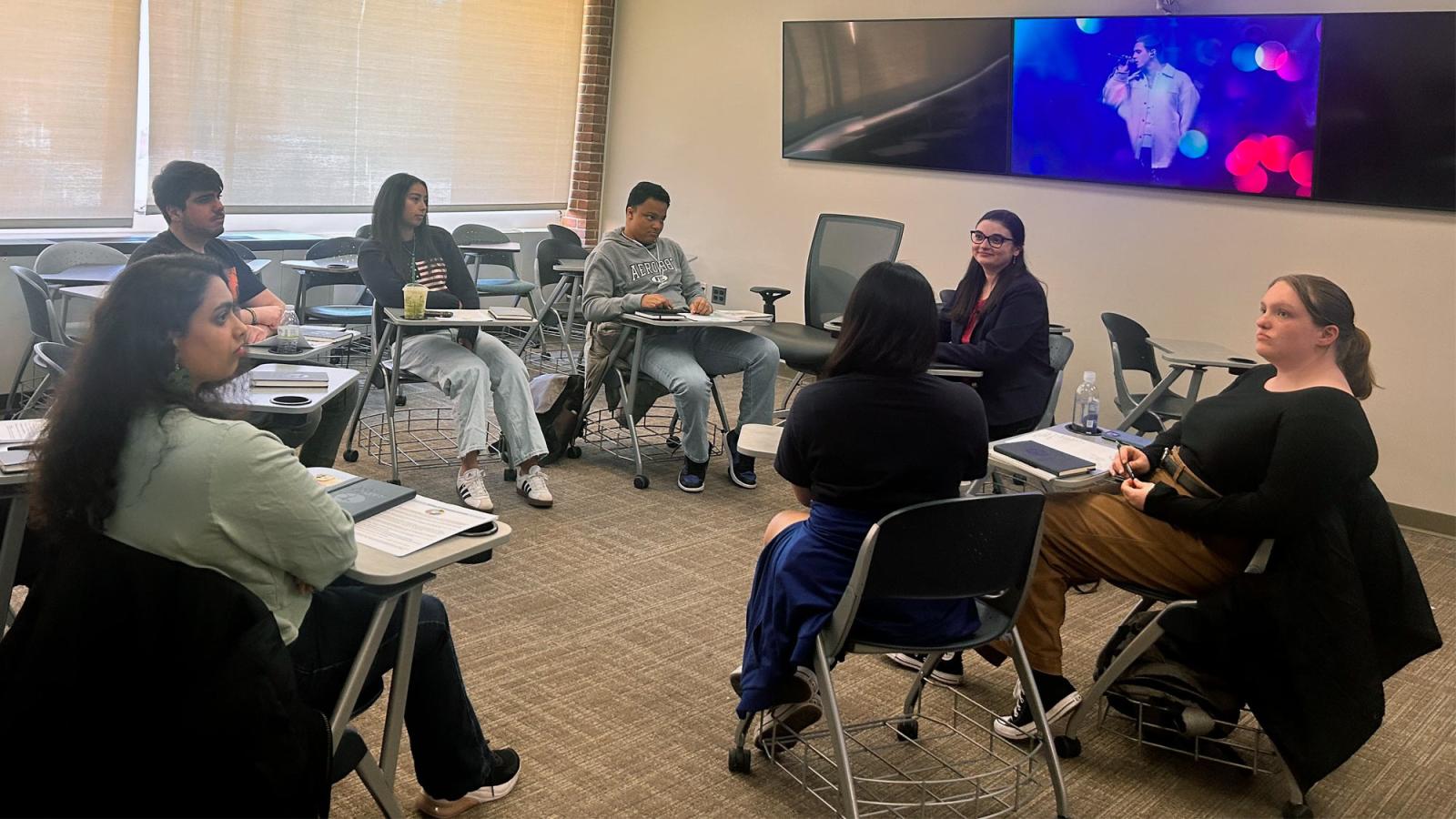

When Stephanie Spruck first stepped onto campus in 2021, she wasn’t entirely sure where she fit in. Like many new students, she felt nervous and unsure of herself. So she decided to try something different: she signed up for RADical Health, a brand-new program at the time that promised to help students build life, resiliency, and wellness skills to better handle college’s ups and downs.
That first four-week cohort was life-changing. Stephanie not only learned practical tools for managing stress and connecting with others, but she also found a community of like-minded people who wanted the same thing: to feel seen, supported, and grounded.
She loved it so much that she signed up again. Then again. Before long, she went from participant to guide. In total, she’s taken part in RADical Health 12 times—twice as a participant and 10 times as a peer guide leader.
“Every time I did it, I got something new out of it,” Stephanie says. “Each time, you peel back the layers a little more and learn something new about yourself and others.”
Over her four years at Pace, Stephanie says the program taught her lessons she’ll carry for life—how to find mentors, communicate more effectively, overcome self-doubt, manage stress, and take chances on new opportunities.
“It really got me out of my comfort zone,” she recalls.
“Every time I did it, I got something new out of it,” Stephanie says. “Each time, you peel back the layers a little more and learn something new about yourself and others.”
That confidence showed up in ways she never expected. When national media outlets such as The TODAY Show, NBC Nightly News, WPIX11, and Bloomberg News featured RADical Health—and Pace as a model for supporting student wellness—Stephanie found herself in front of the camera, representing the program that helped her grow.
RADical Health was created in 2018 by the RADical Hope Foundation, founded by Pam and Phil Martin in memory of their son, Chris, who died by suicide while in college. The goal was simple but powerful: to help young adults build the tools and relationships they need to stay well before reaching a breaking point.
Clearly, there is a need. Studies show that more than 60 percent of college students meet the criteria for at least one mental health problem—a 50 percent increase over the last decade. Additionally, nearly half of students report symptoms of depression, while 37 percent experience anxiety, according to the latest Healthy Minds Study.
Unlike traditional clinical counseling, RADical Health is preventive, peer-led, and deeply personal. Students meet in small groups guided by trained peers, offering a “near-peer” model that reduces judgment and stigma, making it easier to open up and connect. What’s more, it doesn’t replace other services; instead, it serves as an “on-ramp” and complements existing campus resources such as counseling offered by Pace, which in 2026 earned a place on the Princeton Review’s Honor Roll for its focus on mental health services.
RADical Health’s Four Pillars of Resilience
Strengthening Emotional Intelligence: Students explore how they connect with others through active listening and effective communication.
Principles and Priorities: This session encourages self-awareness, helping students align their daily decisions with their core values.
Building Resilience: Participants learn to identify stress cycles and implement practical self-care and stress management strategies.
Creating Positive Outcomes: The final week focuses on self-talk, perspective-shifting, and making informed decisions for the future.
The program first launched as a pilot at New York University in 2020, in the thick of the COVID-19 pandemic, to help students manage the isolation and uncertainty of that time. It took off quickly. Today, RADical Health is offered on more than 85 college campuses across the country—including the University of Maryland, the University of Oregon, and Amherst College—and has reached more than 27,000 students.
Pace was among the first universities to bring the program on board, and the impact has been significant. More than 1,250 Setters have participated so far, according to Sue Maxam, assistant provost for wellness, who co-runs the program with Jerry McKinstry, assistant vice president of public affairs. Many students have reported its benefits, with one crediting it with saving their life, Maxam says.
“It’s been a complete game-changer for students,” Maxam says. It has also had a notable impact on retention—more than 90 percent of participants return to Pace the following year. “Clearly, the program is working.”
“When I talk to recruits and their families, the number one question is always about how we support our student-athletes’ mental health,” Walker says. “RADical Health gives us a proven way to do that.”
More first-year students are joining, and athletics teams—including football, lacrosse, women’s soccer, and swimming—are now making it part of their culture. Maxam credits this momentum in part to professional advocates such as NFL legend Larry Fitzgerald and former Green Bay Packer and Super Bowl champion Aaron Taylor, both vocal supporters of RADical Health. (Taylor even visited Pace in 2023 to speak about the program.)
Pace football coach Chad Walker is fully on board. In his first season as head coach, he decided that all first-year players—44 of them—should participate before the 2025 season even began. Eventually, he hopes the entire roster will take part.
“When I talk to recruits and their families, the number one question is always about how we support our student-athletes’ mental health,” Walker says. “RADical Health gives us a proven way to do that.”
He’s already seeing results. “The partnership has been outstanding,” he says. “It’s helped with communication, resilience, and team building. You can really see the difference in how our guys connect—we’ve got a tight team, and we’re building something special.”
That sense of connection is what drew freestyle swimmer Caroline McKay to Pace as well. A transfer student from Massachusetts, Caroline says her previous school didn’t place the same emphasis on mental health.
“I was so happy when I found out that Pace’s swim team was part of RADical Health,” she says. “Mental health can sometimes be a taboo topic in sports. But it should really be treated just like any other physical injury.”
Now, Caroline says the program has made a noticeable difference in her team’s chemistry. “The trust, camaraderie, and understanding we’ve built through RADical Health—it shows in how we support each other, both in and out of the pool.”
Caroline believes the program should be required for all students.
By prioritizing collective care and critical consciousness, wellness and mental health programs like RADical Health are shifting campus culture from one of silent struggle to one of proactive, shared resilience. It is no longer just about surviving the semester—the tools students gain extend well beyond campus.
Soon after Stephanie graduated from Pace in 2025 with a degree in applied psychology and human relations, she put those lessons to use. She launched a podcast, @withhope_stephaniemarie, focused on wellness and personal growth, and landed a role at Dorie Klissas Media as director of operations, business development, and public relations.
“I’ve learned life is what you make of it,” Stephanie says. “The more you keep seeking opportunities, the more that are going to show up.”
More from Pace Magazine
When Joseph Benfield ’91, Kathy-Ann Edwards ’93, and Franklyn Smith ’89 arrived at Pace from across the Caribbean, they found more than an education—they found a community that believed in them. Today, they are channeling that shared experience into meaningful impact, establishing a scholarship that honors their journey and invests in the future of Caribbean and Black business students at Pace.
With 1.5 million TED Talk views, seven books, and a record of transformative academic leadership, Pace University’s newest provost is bringing bold ideas—and big energy—to campus.
Higher education is being reshaped by rapid change and leadership matters more than ever. This fall, we welcomed Ajay Khorana, PhD, as dean of the Lubin School of Business and Brian Goldstein, PhD, as dean of the College of Health Professions, two accomplished leaders whose expertise bridges academic rigor, industry insight, and student outcomes.
Winter 2026: 10 Things to Inspire
Broadway stages. Global policy wins. A first-of-its-kind AI degree. Record-breaking generosity. And students leading real change—from healthcare and environmental advocacy to protecting New York’s wildlife. The Winter 2026 edition of "10 Things to Inspire You" captures just a snapshot of the momentum driving the Pace Community forward.


At Pace University, progress isn’t abstract; it’s happening every day, in classrooms, courtrooms, clinics, studios, labs, and communities around the world. From preparing the next generation of healthcare leaders and advancing global environmental policy, to taking center stage on Broadway, shaping the future of AI, and showing up for one another in record-breaking ways, the Pace Community continues to turn ambition into impact.
$3M Grant to Prepare the Next Generation of Healthcare Leaders
Pace University was awarded more than $3 million from the New York State Department of Health to launch the College of Health Professions Pathways to Practice Initiative, a major effort to strengthen the region’s healthcare workforce pipeline. The funding supported expanded access for students, enhanced pre-health advising, and new training opportunities designed to prepare advanced healthcare students to meet critical workforce needs in the Lower and Mid-Hudson Valley. Through this initiative, Pace students gained clearer pathways into high-demand clinical fields and stronger preparation for careers that directly serve their communities.
Pace Ranks #5 in the Nation for Broadway Representation
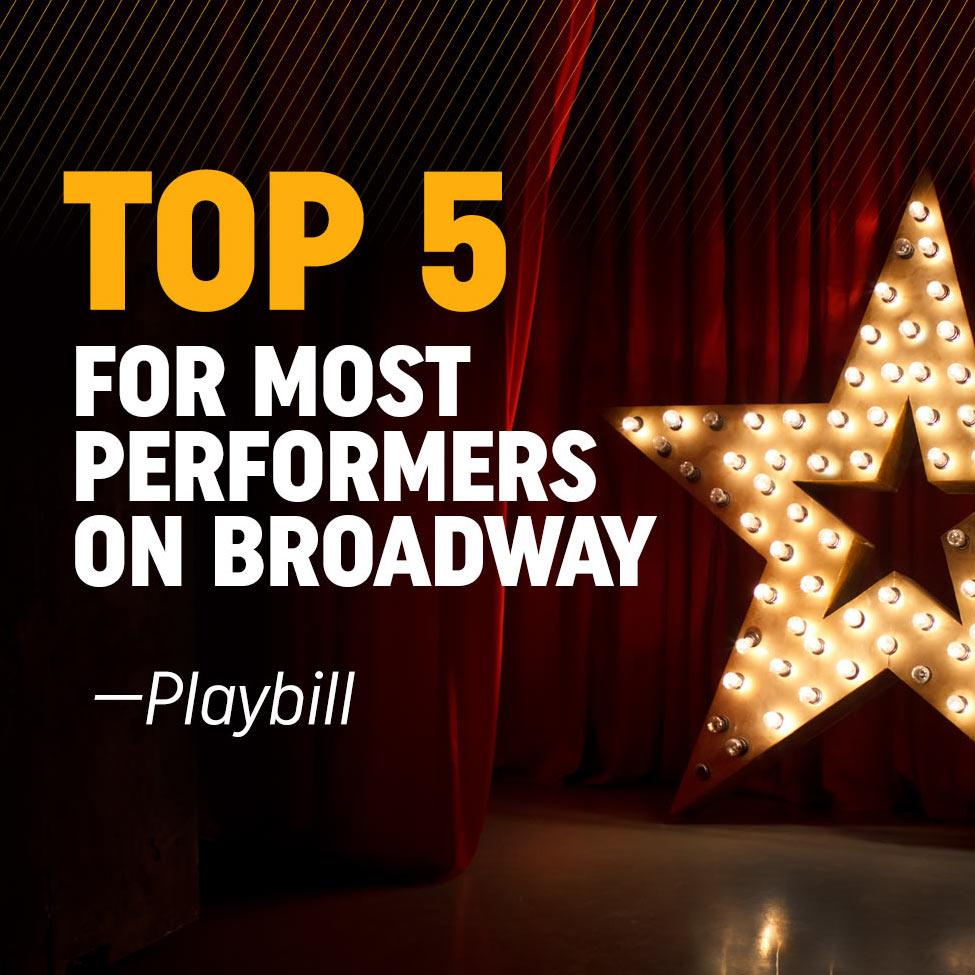
Pace University clearly knows how to make it to the main stage. This past Broadway season, Pace talent appeared in productions including Wicked, & Juliet, Suffs, The Outsiders, Hamilton, Cabaret at the Kit Kat Club, and The Outsiders, among others. Check out Playbill’s Big 10 list of schools and colleges with the most representation on Broadway—Pace ranked number five, ahead of both Yale and Juilliard.
Pace Moves Up in Wall Street Journal Rankings
Pace advanced 15 places in The Wall Street Journal’s 2026 Best Colleges Rankings, earning recognition for student success, affordability, and diversity. With a perfect diversity score of 100, Pace stands out as a leader in access and opportunity.
1,453 Reasons to Be Proud: Pace’s Biggest Giving Tuesday Yet
In just 24 hours, the Pace University community came together to exceed every expectation. More than 1,453 donors—alumni, parents, students, and friends from across the country—surpassed our ambitious goal of 1,000 donors, contributing an incredible $270,691 in direct support of Pace students. This extraordinary show of generosity is already fueling academic innovation, expanding student services, and opening new pathways to success across our campuses.
Professor Collica-Cox Recognized for Transformative ‘Puppies on the Block’ Partnership
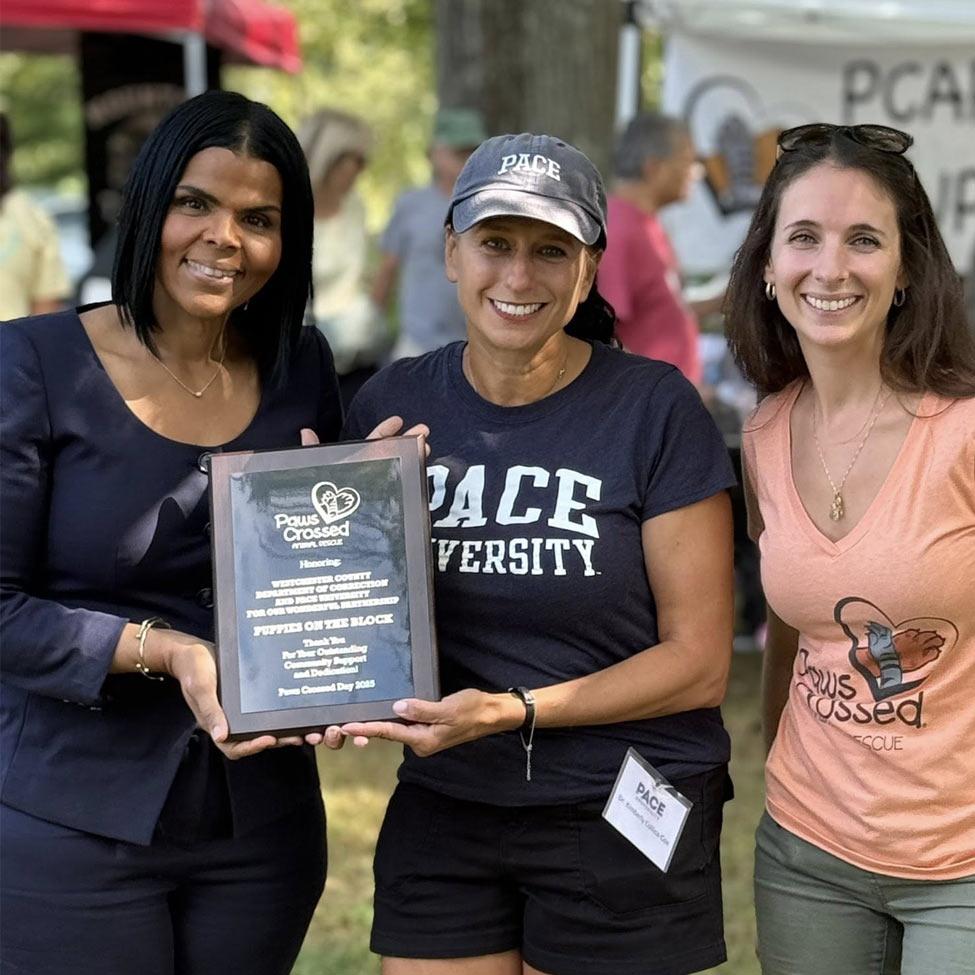
Pace University’s Puppies on the Block program and Professor Kimberly Collica-Cox were recently honored by Paws Crossed Animal Rescue, alongside the Westchester County Department of Correction. The recognition celebrated the program’s powerful partnership—giving rescue dogs a second chance while creating meaningful, rehabilitative experiences for students and incarcerated individuals. Congratulations to Professor Collica-Cox for her leadership in strengthening communities, paws and people alike.
Pace Haub Law Students Influenced Global Environmental Policy
The Elisabeth Haub School of Law at Pace University announced that ten policy motions led by Haub Law students were officially adopted at the International Union for the Conservation of Nature (IUCN) World Conservation Congress. A dedicated team of four faculty members, five students, and six alumni traveled to Abu Dhabi, where they negotiated revisions, crafted urgent new motions, presented at sessions, addressed the IUCN President, and advanced Pace’s longstanding commitment to environmental advocacy on the world stage.
Pace Launches Westchester’s First Undergraduate AI Degree
Pace University expanded its tech-focused academic offerings with the launch of a new Bachelor of Science in Artificial Intelligence, becoming the first school in Westchester County to offer a dedicated undergraduate AI degree. Offered through the Seidenberg School of Computer Science and Information Systems, the program prepared students with essential skills in machine learning, large language models, natural language processing, data analysis, and AI ethics. Students gained hands-on experience through research, industry partnerships, and experiential learning connected to New York’s growing tech ecosystem.
Pace Students Lead New Effort to Protect New York’s Wildlife

Pace University students took on a central role in a new partnership between the Animal Policy Project and the New York State Wildlife Rehabilitation Council, formed in response to rising threats to wildlife across the region. Through this alliance, students helped collect data, support community education efforts, and contribute to policy work that protects vulnerable species. Their hands-on experience was highlighted by the rehabilitation and release of a juvenile red-tailed hawk at Pace’s Suburban Biodiversity Conservation Center, giving students a direct role in safeguarding the future of New York’s wildlife.
Pace Students Earn Global Recognition in UN Millennium Fellowship
Thirty-four Pace University students were selected for the prestigious United Nations Academic Impact and Millennium Campus Network Millennium Fellowship, placing them among the top 4% of applicants worldwide. This marked Pace’s largest cohort yet and the fifth consecutive year students earned a place in the highly competitive leadership program.
Google Leader Joined Pace for Inaugural Actionable AI Conference
Pace University hosted its inaugural Actionable AI Conference, where students, faculty, and industry leaders gathered to explore how artificial intelligence is transforming higher education and the future of work. Charles Elliot, head of industry at Google Cloud, spoke to a full room, emphasizing the importance of curiosity, user-focused design, and continuous learning when working with AI tools.
More from Pace Magazine
Pace’s Federal Reserve Challenge Team has secured a record-breaking sixth national championship title. Team Captain Suraj Sharma ’26 opens up about the grind, the growth, and the meaning behind the historic win.
Fifty students. Six sessions. One life-changing experience. As the Center for Leadership and Emotional Intelligence wraps its inaugural program, leaders from across Pace reflect on its impact and share their vision for the future.
When Joseph Benfield ’91, Kathy-Ann Edwards ’93, and Franklyn Smith ’89 arrived at Pace from across the Caribbean, they found more than an education—they found a community that believed in them. Today, they are channeling that shared experience into meaningful impact, establishing a scholarship that honors their journey and invests in the future of Caribbean and Black business students at Pace.
